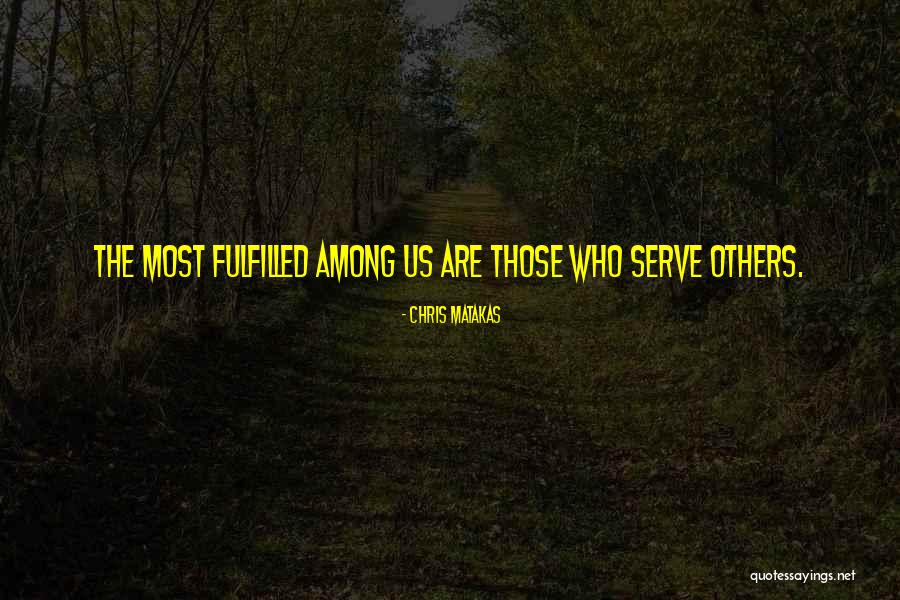Among Others Quotes & Sayings
Enjoy reading and share 100 famous quotes about Among Others with everyone.
Top Among Others Quotes
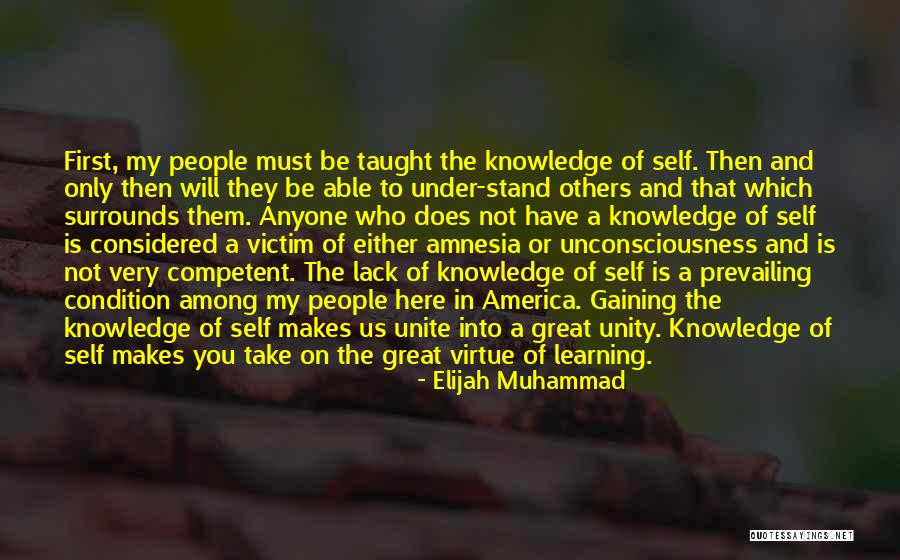
First, my people must be taught the knowledge of self. Then and only then will they be able to under-stand others and that which surrounds them. Anyone who does not have a knowledge of self is considered a victim of either amnesia or unconsciousness and is not very competent. The lack of knowledge of self is a prevailing condition among my people here in America. Gaining the knowledge of self makes us unite into a great unity. Knowledge of self makes you take on the great virtue of learning. — Elijah Muhammad
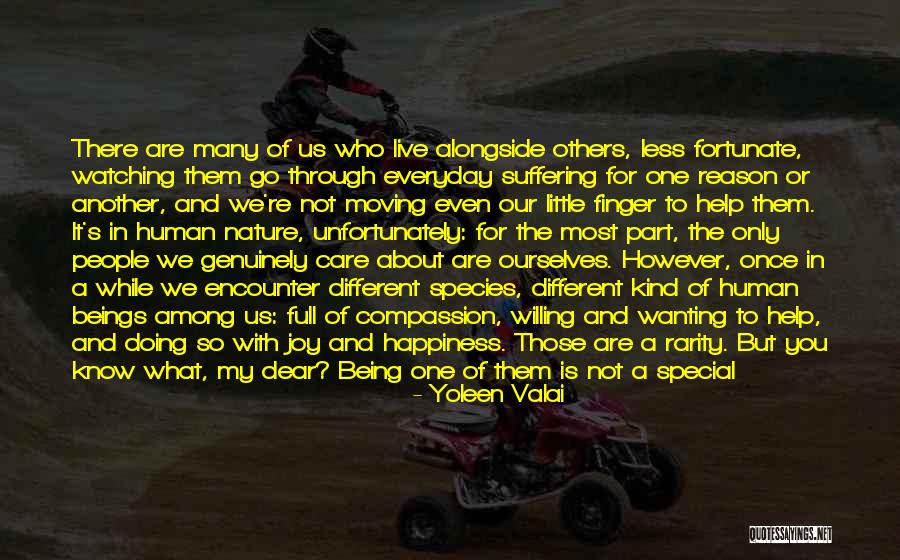
There are many of us who live alongside others, less fortunate, watching them go through everyday suffering for one reason or another, and we're not moving even our little finger to help them. It's in human nature, unfortunately: for the most part, the only people we genuinely care about are ourselves. However, once in a while we encounter different species, different kind of human beings among us: full of compassion, willing and wanting to help, and doing so with joy and happiness. Those are a rarity. But you know what, my dear? Being one of them is not a special calling- it's a choice. So what will you choose, huh? — Yoleen Valai
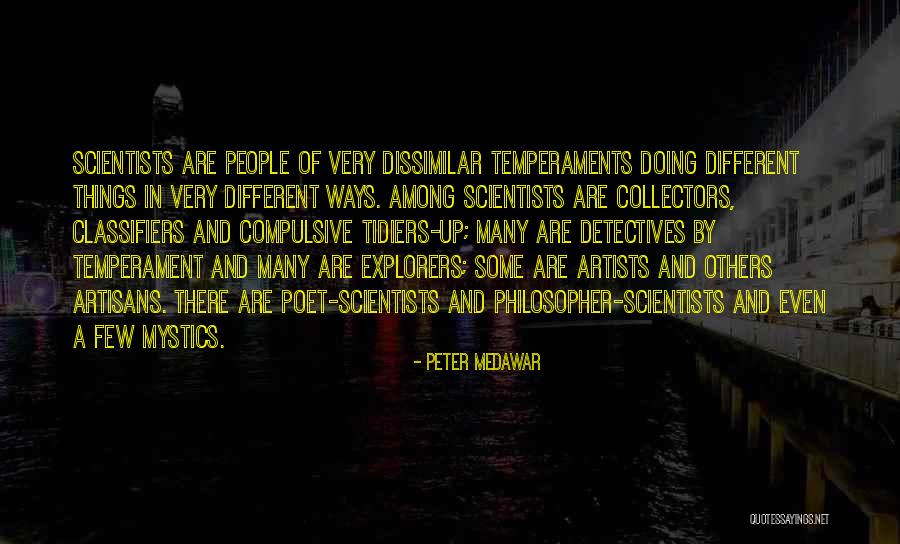
Scientists are people of very dissimilar temperaments doing different things in very different ways. Among scientists are collectors, classifiers and compulsive tidiers-up; many are detectives by temperament and many are explorers; some are artists and others artisans. There are poet-scientists and philosopher-scientists and even a few mystics. — Peter Medawar
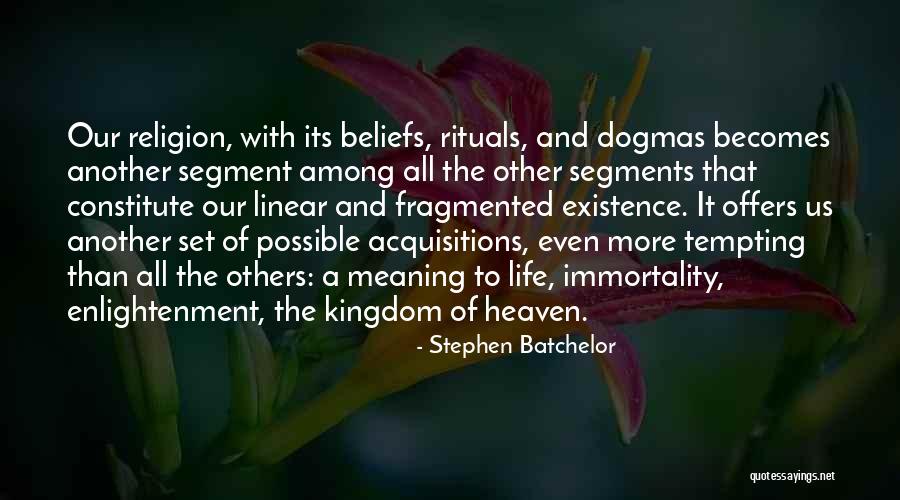
Our religion, with its beliefs, rituals, and dogmas becomes another segment among all the other segments that constitute our linear and fragmented existence. It offers us another set of possible acquisitions, even more tempting than all the others: a meaning to life, immortality, enlightenment, the kingdom of heaven. — Stephen Batchelor
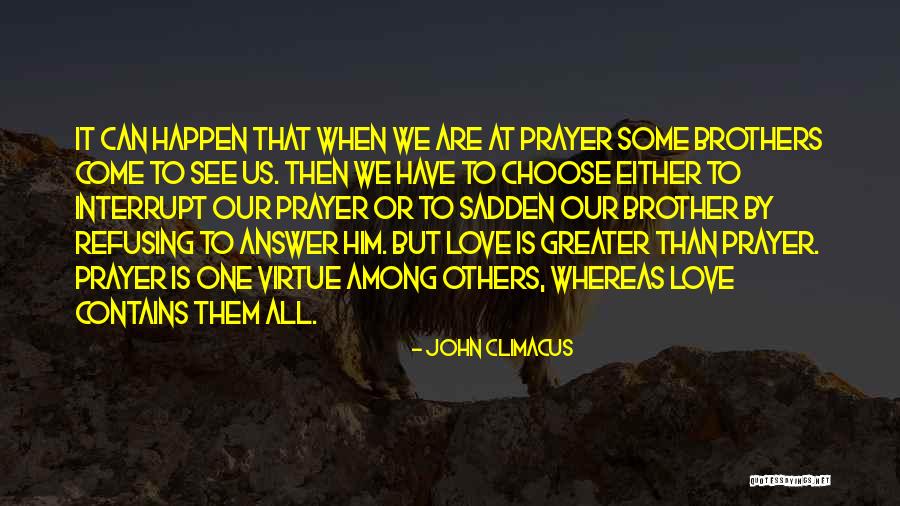
It can happen that when we are at prayer some brothers come to see us. Then we have to choose either to interrupt our prayer or to sadden our brother by refusing to answer him. But love is greater than prayer. Prayer is one virtue among others, whereas love contains them all. — John Climacus
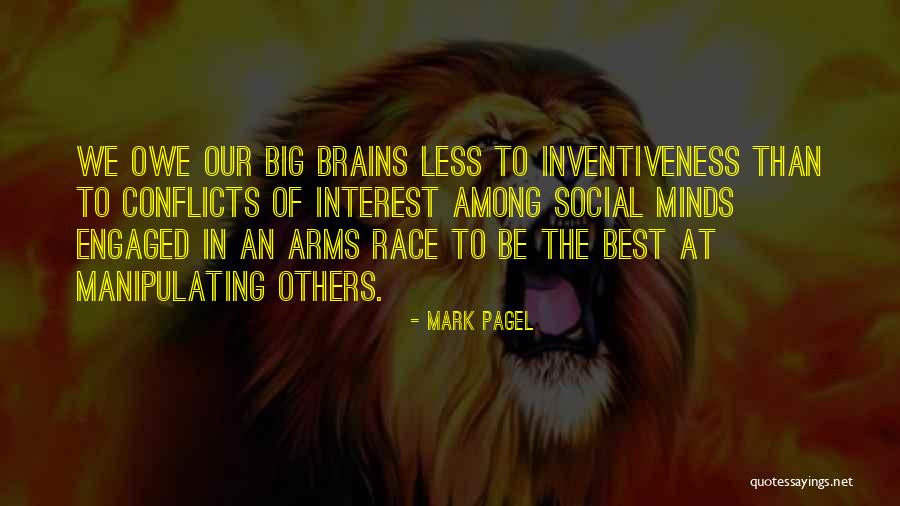
We owe our big brains less to inventiveness than to conflicts of interest among social minds engaged in an arms race to be the best at manipulating others. — Mark Pagel
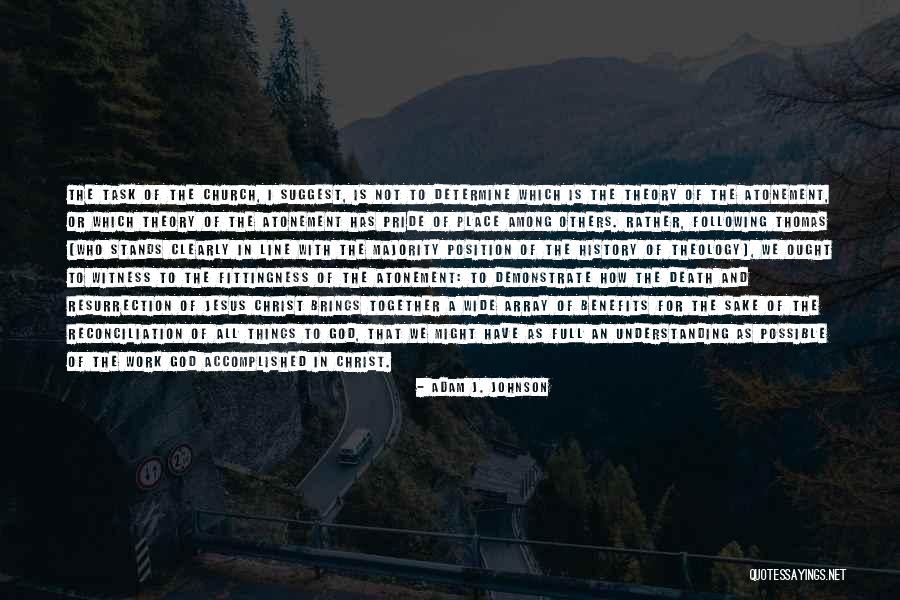
The task of the Church, I suggest, is not to determine which is the theory of the atonement, or which theory of the atonement has pride of place among others. Rather, following Thomas (who stands clearly in line with the majority position of the history of theology), we ought to witness to the fittingness of the atonement: to demonstrate how the death and resurrection of Jesus Christ brings together a wide array of benefits for the sake of the reconciliation of all things to God, that we might have as full an understanding as possible of the work God accomplished in Christ. — Adam J. Johnson
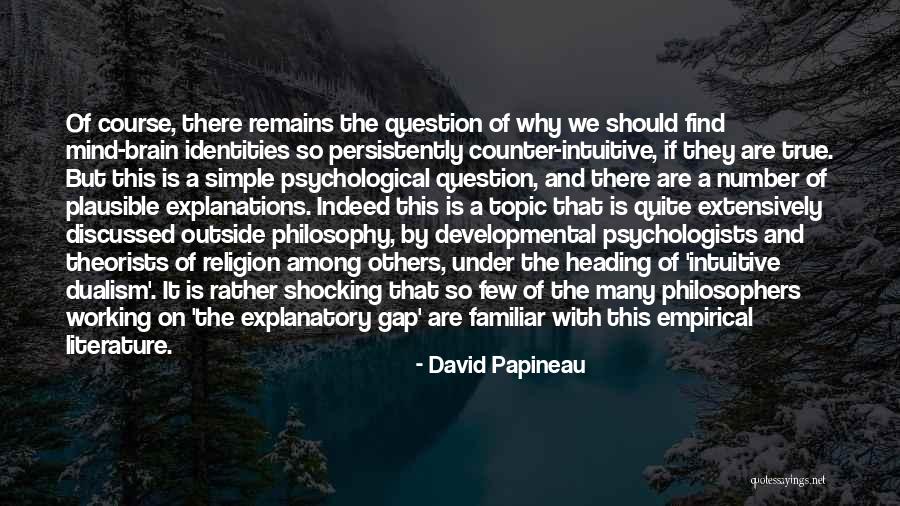
Of course, there remains the question of why we should find mind-brain identities so persistently counter-intuitive, if they are true. But this is a simple psychological question, and there are a number of plausible explanations. Indeed this is a topic that is quite extensively discussed outside philosophy, by developmental psychologists and theorists of religion among others, under the heading of 'intuitive dualism'. It is rather shocking that so few of the many philosophers working on 'the explanatory gap' are familiar with this empirical literature. — David Papineau
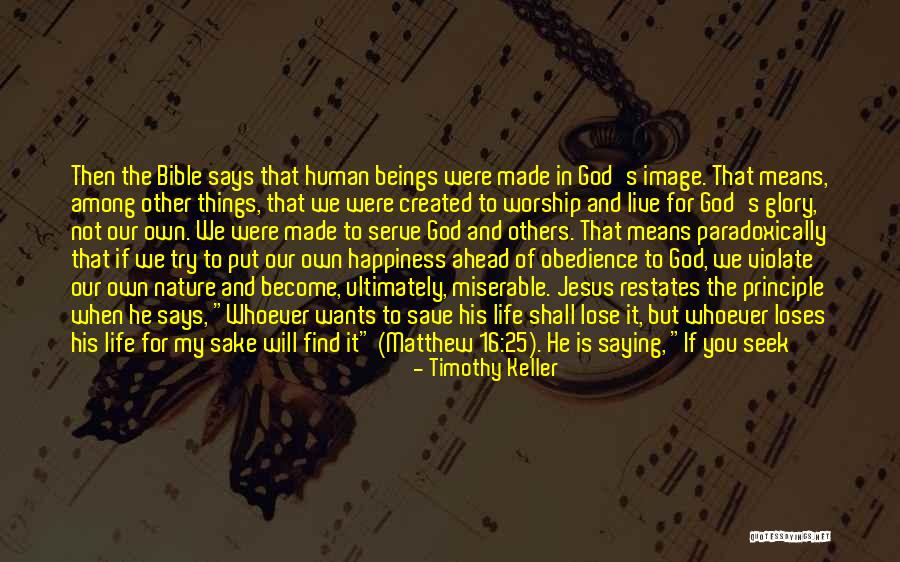
Then the Bible says that human beings were made in God's image. That means, among other things, that we were created to worship and live for God's glory, not our own. We were made to serve God and others. That means paradoxically that if we try to put our own happiness ahead of obedience to God, we violate our own nature and become, ultimately, miserable. Jesus restates the principle when he says, "Whoever wants to save his life shall lose it, but whoever loses his life for my sake will find it" (Matthew 16:25). He is saying, "If you seek happiness more than you seek me, you will have neither; if you seek to serve me more than serve happiness, you will have both. — Timothy Keller
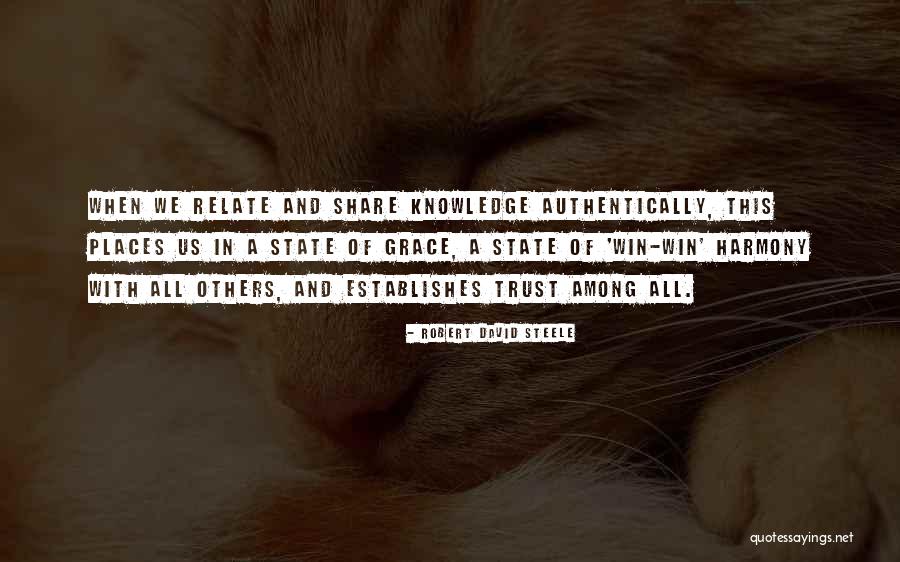
When we relate and share knowledge authentically, this places us in a state of grace, a state of 'win-win' harmony with all others, and establishes trust among all. — Robert David Steele
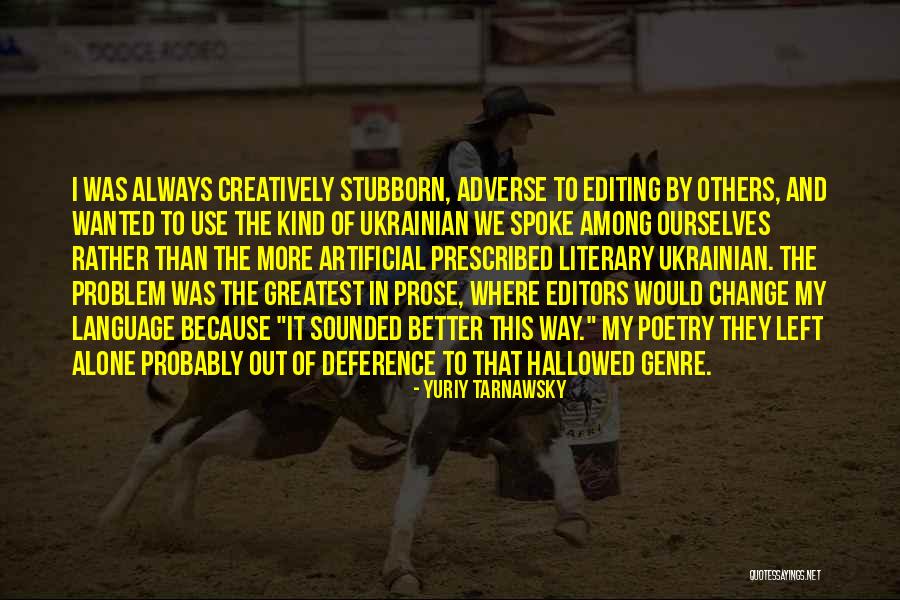
I was always creatively stubborn, adverse to editing by others, and wanted to use the kind of Ukrainian we spoke among ourselves rather than the more artificial prescribed literary Ukrainian. The problem was the greatest in prose, where editors would change my language because "it sounded better this way." My poetry they left alone probably out of deference to that hallowed genre. — Yuriy Tarnawsky
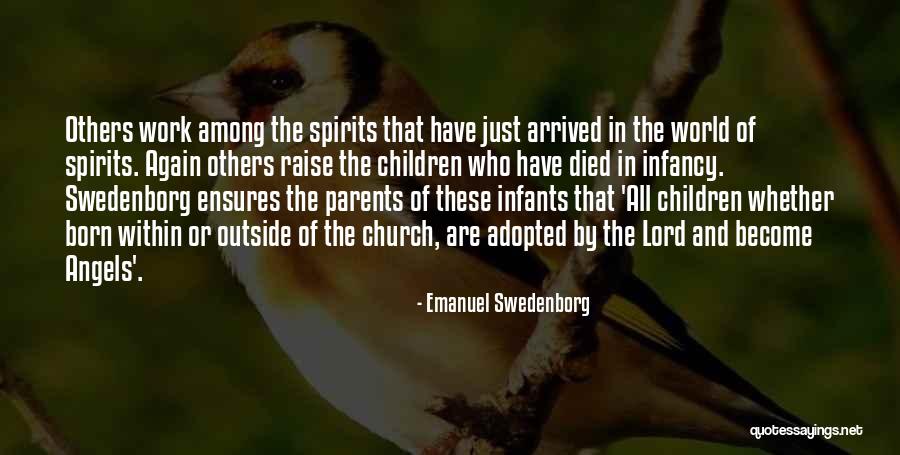
Others work among the spirits that have just arrived in the world of spirits. Again others raise the children who have died in infancy. Swedenborg ensures the parents of these infants that 'All children whether born within or outside of the church, are adopted by the Lord and become Angels'. — Emanuel Swedenborg

Sara knelt. She was becoming smaller, lighter, and then she was down among the insects, and the only thing in the world was the noise of them, the churn of their bodies upon one another, the clack of their black hulls, a heavenly vibration that resounded only because they were pushing in the same direction, and they were invincible. They crawled onto her legs and began eating her cotton skirt. She placed her hands down for them to crawl upon her, some of them swarming by and others stopping to chew at her clothing or hang from her skirt, and she was surrounded, feeling the scratch of their legs and the points of their antennae and their light husks. Her mind calmed, and she felt herself lifted into the air by the hand of God. — Shawn Vestal

I have found a paper of mine among some others in which I call architecture 'petrified music.' Really there is something in this; the tone of mind produced by architecture approaches the effect of music. — Johann Wolfgang Von Goethe
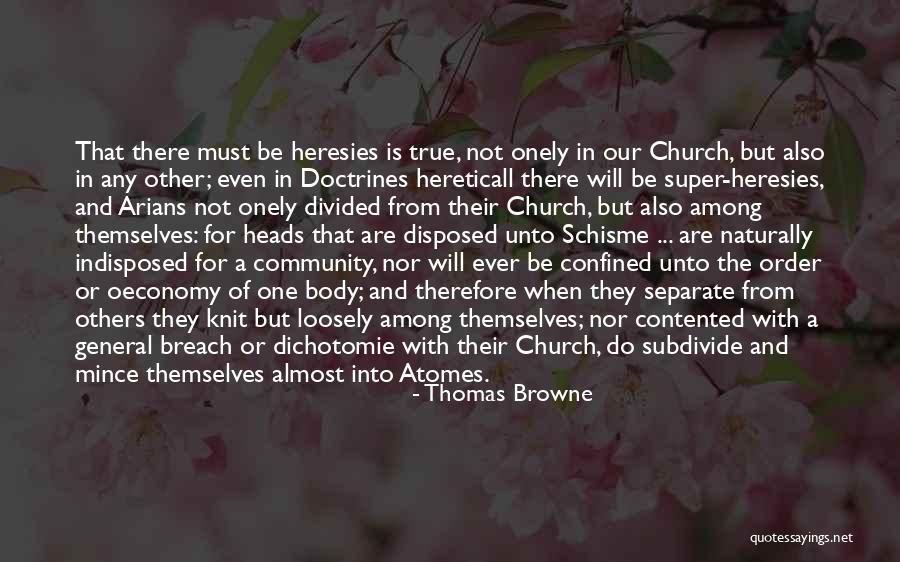
That there must be heresies is true, not onely in our Church, but also in any other; even in Doctrines hereticall there will be super-heresies, and Arians not onely divided from their Church, but also among themselves: for heads that are disposed unto Schisme ... are naturally indisposed for a community, nor will ever be confined unto the order or oeconomy of one body; and therefore when they separate from others they knit but loosely among themselves; nor contented with a general breach or dichotomie with their Church, do subdivide and mince themselves almost into Atomes. — Thomas Browne
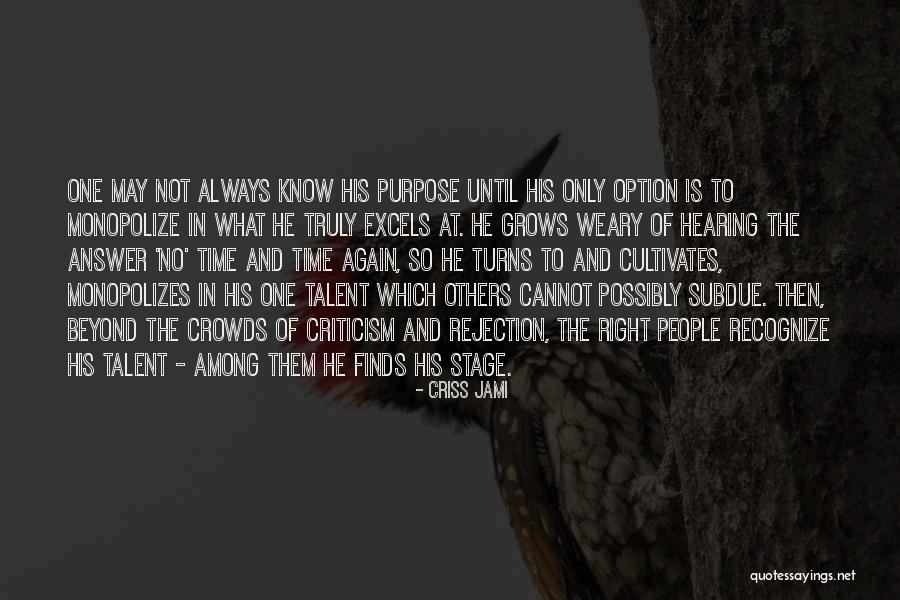
One may not always know his purpose until his only option is to monopolize in what he truly excels at. He grows weary of hearing the answer 'no' time and time again, so he turns to and cultivates, monopolizes in his one talent which others cannot possibly subdue. Then, beyond the crowds of criticism and rejection, the right people recognize his talent - among them he finds his stage. — Criss Jami
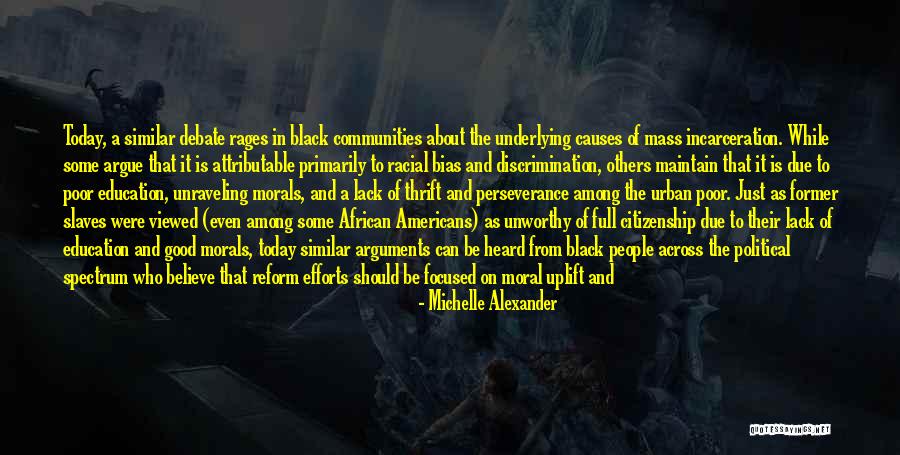
Today, a similar debate rages in black communities about the underlying causes of mass incarceration. While some argue that it is attributable primarily to racial bias and discrimination, others maintain that it is due to poor education, unraveling morals, and a lack of thrift and perseverance among the urban poor. Just as former slaves were viewed (even among some African Americans) as unworthy of full citizenship due to their lack of education and good morals, today similar arguments can be heard from black people across the political spectrum who believe that reform efforts should be focused on moral uplift and education for ghetto dwellers, rather than challenging the system of mass incarceration itself. — Michelle Alexander

Yes. My mother was and still is a Folk Singer. She was very involved in the political movements for Unions and Civil rights. She sang with Pete Seeger among others. My father was an Actor. — Vicki Sue Robinson

What!" cried he, in an accent of greater astonishment than beforem "your second witness is Monsieur Aramis?"
"Doubtless! Are you not aware that we are never seen one without the others, and that we are called among the Musketeers and the Guards, at the court and in the city, Athos, Porthos, and Aramis, or the Three Inseparables? — Alexandre Dumas
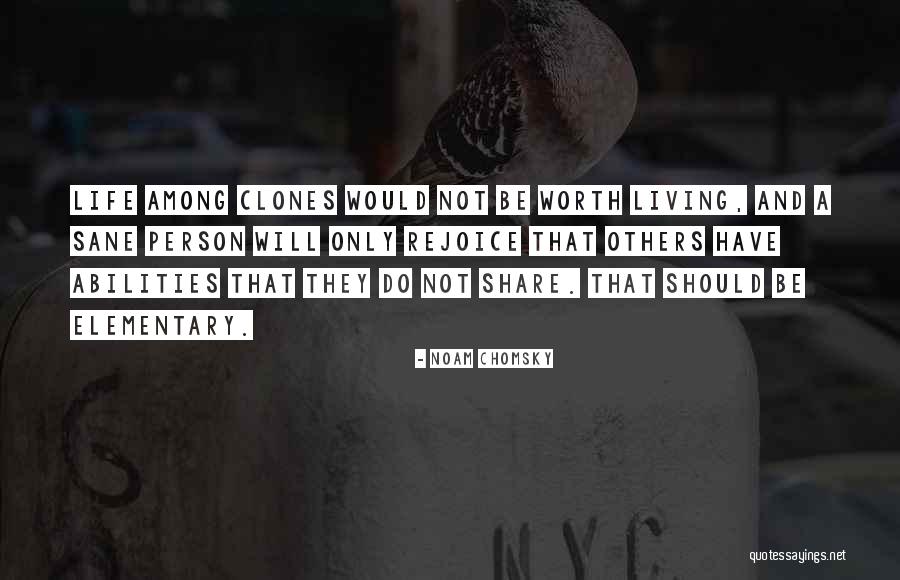
Life among clones would not be worth living, and a sane person will only rejoice that others have abilities that they do not share. That should be elementary. — Noam Chomsky
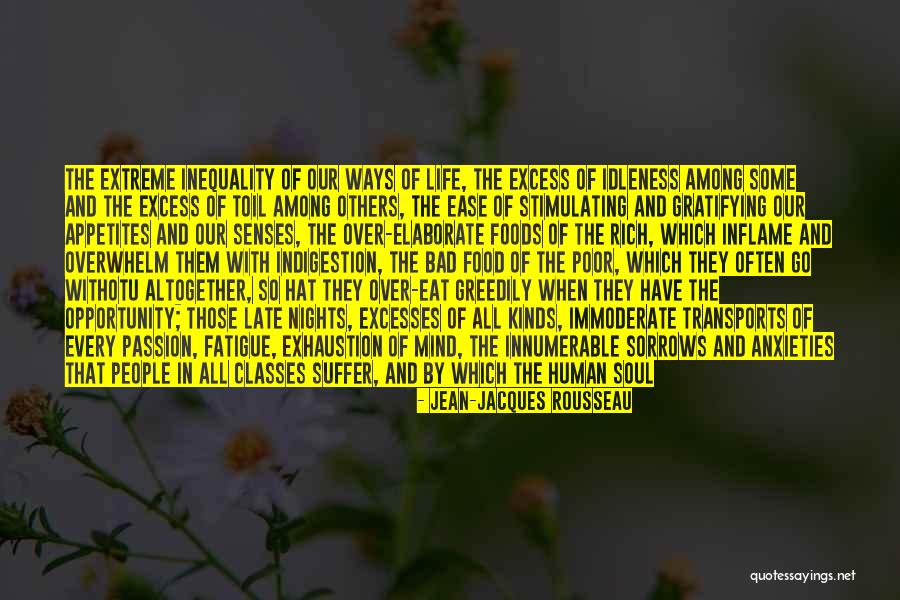
The extreme inequality of our ways of life, the excess of idleness among some and the excess of toil among others, the ease of stimulating and gratifying our appetites and our senses, the over-elaborate foods of the rich, which inflame and overwhelm them with indigestion, the bad food of the poor, which they often go withotu altogether, so hat they over-eat greedily when they have the opportunity; those late nights, excesses of all kinds, immoderate transports of every passion, fatigue, exhaustion of mind, the innumerable sorrows and anxieties that people in all classes suffer, and by which the human soul is constantly tormented: these are the fatal proofs that most of our ills are of our own making, and that we might have avoided nearly all of them if only we had adhered to the simple, unchanging and solitary way of life that nature ordained for us. — Jean-Jacques Rousseau
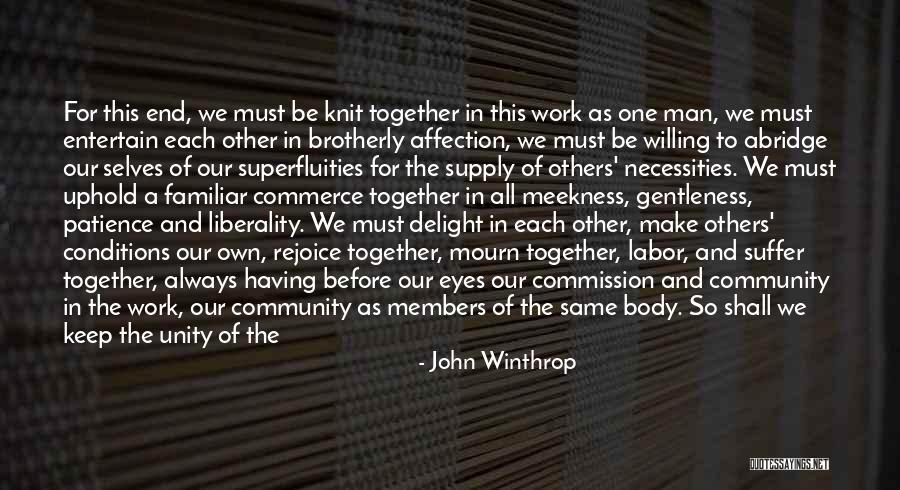
For this end, we must be knit together in this work as one man, we must entertain each other in brotherly affection, we must be willing to abridge our selves of our superfluities for the supply of others' necessities. We must uphold a familiar commerce together in all meekness, gentleness, patience and liberality. We must delight in each other, make others' conditions our own, rejoice together, mourn together, labor, and suffer together, always having before our eyes our commission and community in the work, our community as members of the same body. So shall we keep the unity of the spirit in the bond of peace, the Lord will be our God and delight to dwell among us, as His own people and will command a blessing upon us in all our ways, so that we shall see much more of His wisdom, power, goodness, and truth then formerly we have been acquainted with. — John Winthrop
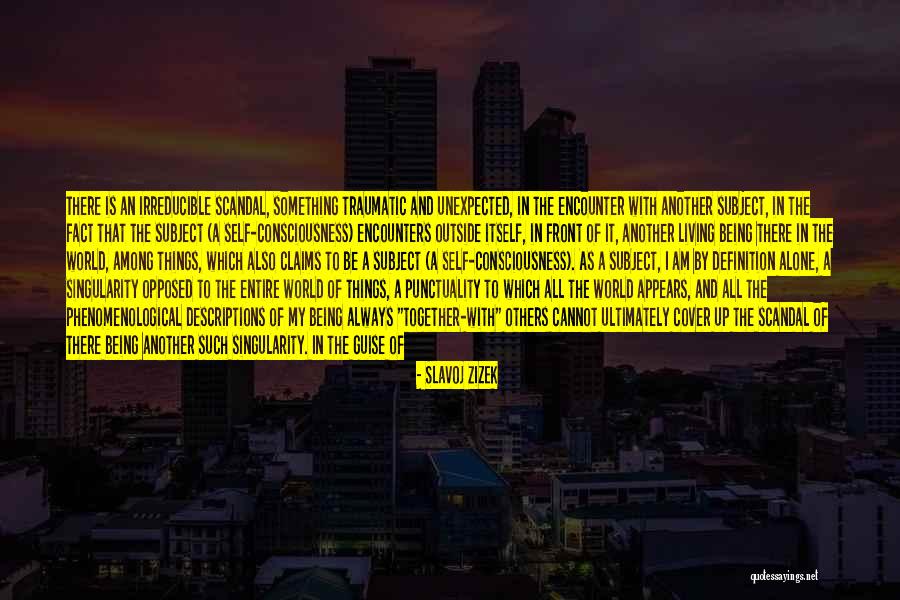
There is an irreducible scandal, something traumatic and unexpected, in the encounter with another subject, in the fact that the subject (a self-consciousness) encounters outside itself, in front of it, another living being there in the world, among things, which also claims to be a subject (a self-consciousness). As a subject, I am by definition alone, a singularity opposed to the entire world of things, a punctuality to which all the world appears, and all the phenomenological descriptions of my being always "together-with" others cannot ultimately cover up the scandal of there being another such singularity. In the guise of a living being in front of me which also claims to be a self-consciousness, infinity assumes a determinate form"- Hegel, — Slavoj Zizek
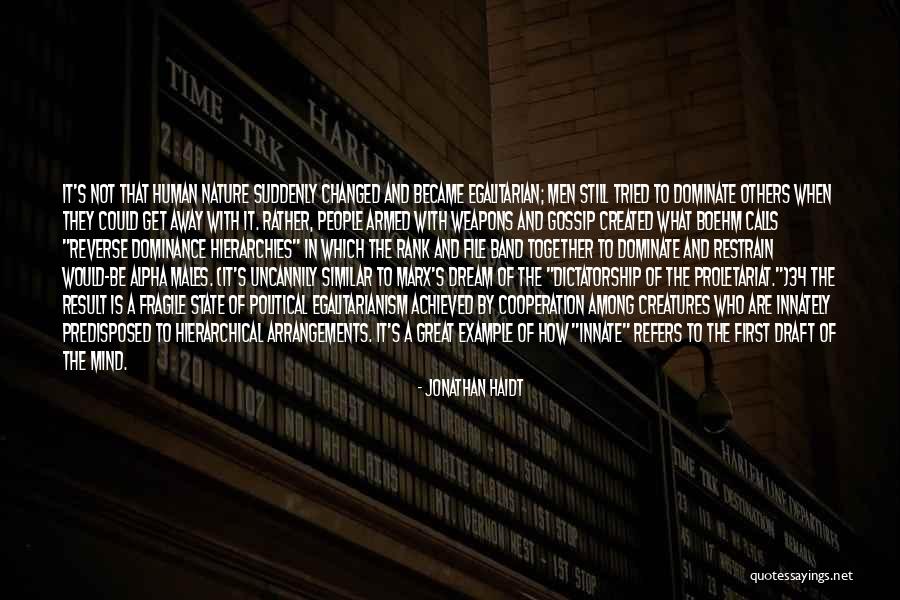
It's not that human nature suddenly changed and became egalitarian; men still tried to dominate others when they could get away with it. Rather, people armed with weapons and gossip created what Boehm calls "reverse dominance hierarchies" in which the rank and file band together to dominate and restrain would-be alpha males. (It's uncannily similar to Marx's dream of the "dictatorship of the proletariat.")34 The result is a fragile state of political egalitarianism achieved by cooperation among creatures who are innately predisposed to hierarchical arrangements. It's a great example of how "innate" refers to the first draft of the mind. The final edition can look quite different, so it's a mistake to look at today's hunter-gatherers and say, "See, that's what human nature really looks like! — Jonathan Haidt
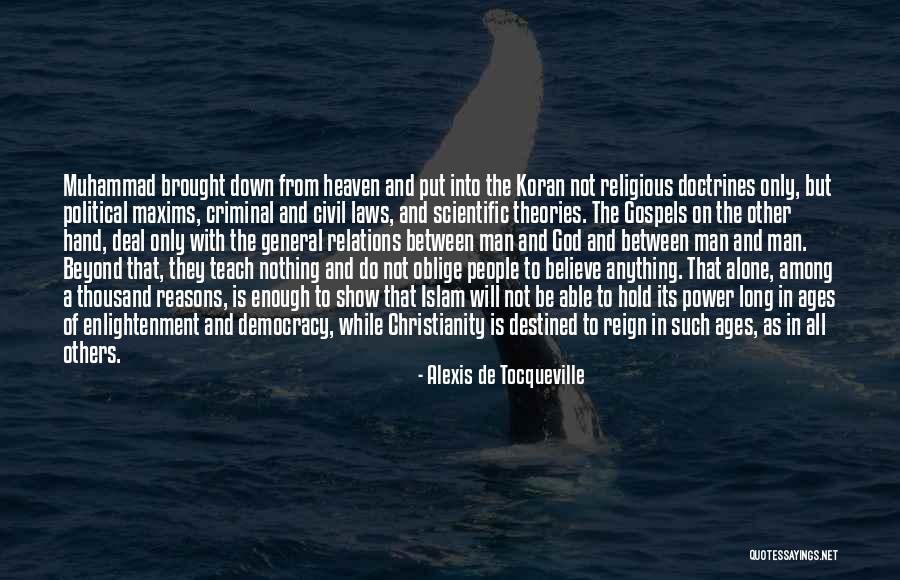
Muhammad brought down from heaven and put into the Koran not religious doctrines only, but political maxims, criminal and civil laws, and scientific theories. The Gospels on the other hand, deal only with the general relations between man and God and between man and man. Beyond that, they teach nothing and do not oblige people to believe anything. That alone, among a thousand reasons, is enough to show that Islam will not be able to hold its power long in ages of enlightenment and democracy, while Christianity is destined to reign in such ages, as in all others. — Alexis De Tocqueville
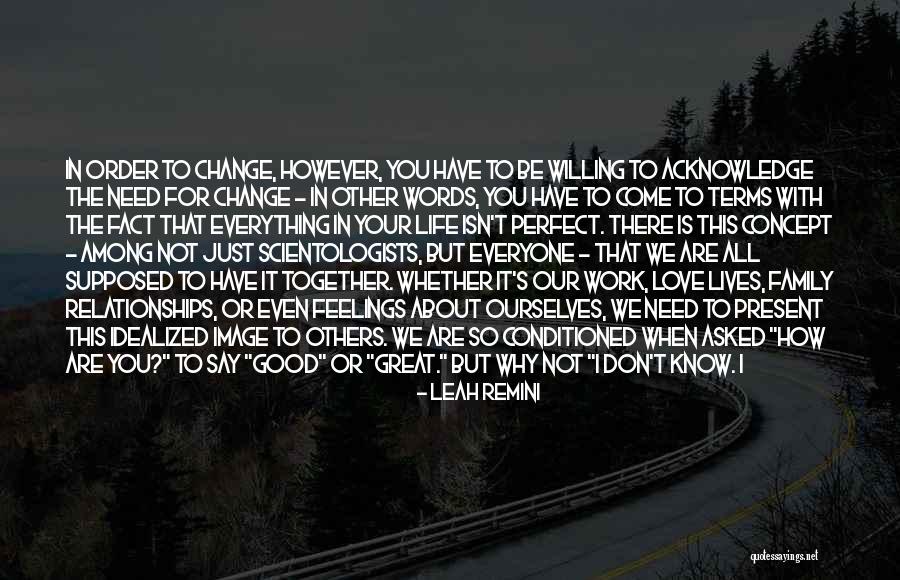
In order to change, however, you have to be willing to acknowledge the need for change - in other words, you have to come to terms with the fact that everything in your life isn't perfect. There is this concept - among not just Scientologists, but everyone - that we are all supposed to have it together. Whether it's our work, love lives, family relationships, or even feelings about ourselves, we need to present this idealized image to others. We are so conditioned when asked "How are you?" to say "Good" or "Great." But why not "I don't know. I hate everyone today." Why are we so scared to be judged imperfect or to talk about how we really feel? To be authentic? If we can just tell each other how and what we are really doing, step outside of what we believe others think we should be, the result can be therapeutic. — Leah Remini
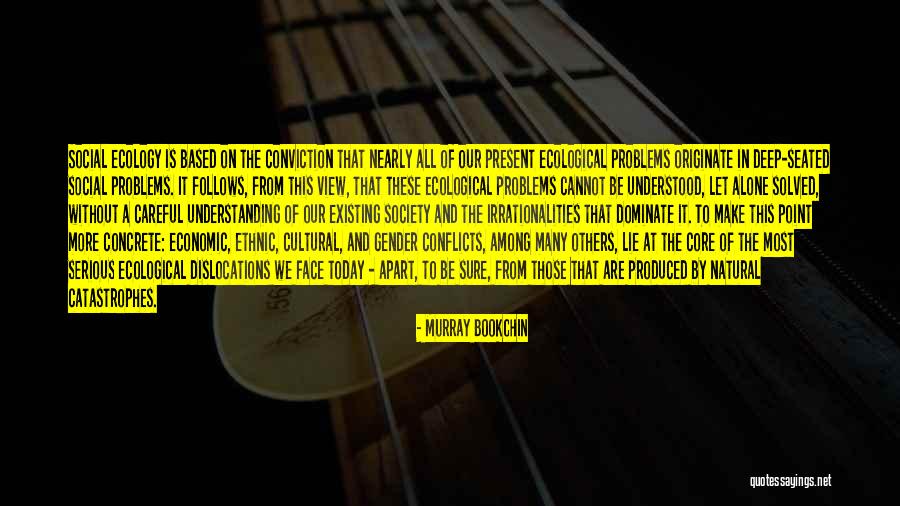
Social ecology is based on the conviction that nearly all of our present ecological problems originate in deep-seated social problems. It follows, from this view, that these ecological problems cannot be understood, let alone solved, without a careful understanding of our existing society and the irrationalities that dominate it. To make this point more concrete: economic, ethnic, cultural, and gender conflicts, among many others, lie at the core of the most serious ecological dislocations we face today - apart, to be sure, from those that are produced by natural catastrophes. — Murray Bookchin
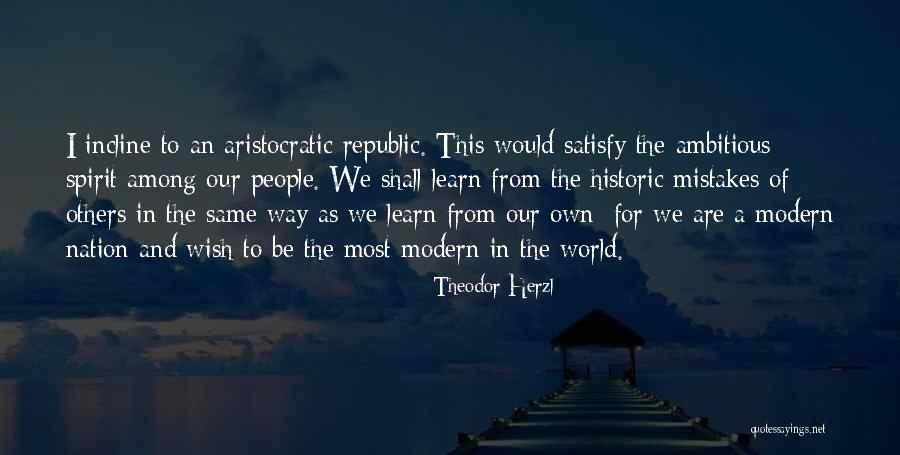
I incline to an aristocratic republic. This would satisfy the ambitious spirit among our people. We shall learn from the historic mistakes of others in the same way as we learn from our own; for we are a modern nation and wish to be the most modern in the world. — Theodor Herzl
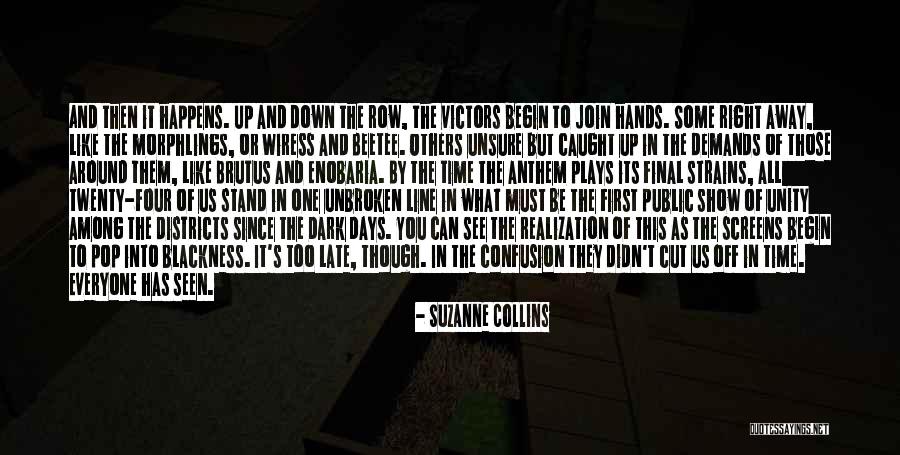
And then it happens. Up and down the row, the victors begin to join hands. Some right away, like the morphlings, or Wiress and Beetee. Others unsure but caught up in the demands of those around them, like Brutus and Enobaria. By the time the anthem plays its final strains, all twenty-four of us stand in one unbroken line in what must be the first public show of unity among the districts since the Dark Days. You can see the realization of this as the screens begin to pop into blackness. It's too late, though. In the confusion they didn't cut us off in time. Everyone has seen. — Suzanne Collins
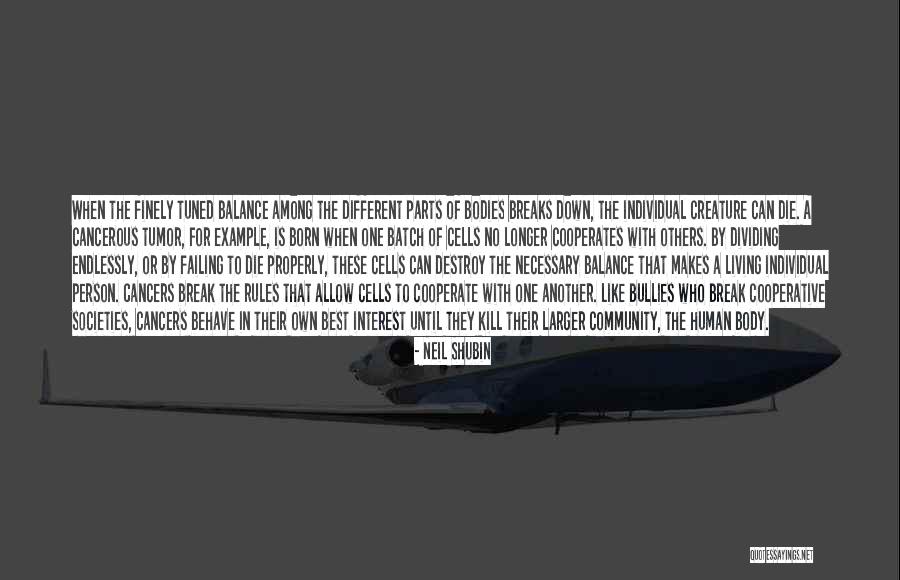
When the finely tuned balance among the different parts of bodies breaks down, the individual creature can die. A cancerous tumor, for example, is born when one batch of cells no longer cooperates with others. By dividing endlessly, or by failing to die properly, these cells can destroy the necessary balance that makes a living individual person. Cancers break the rules that allow cells to cooperate with one another. Like bullies who break cooperative societies, cancers behave in their own best interest until they kill their larger community, the human body. — Neil Shubin

If you look to anyone to satisfy your longing, you will think you need something more than him and what he has made you to be complete and at peace. The expectation of fulfillment in relationships will always fail you, and you will hold grievances that darken your world. You will become blind to the light that guides to the narrow path. You were taught this on the mountain alone, and yet among others you forget. — Ted Dekker
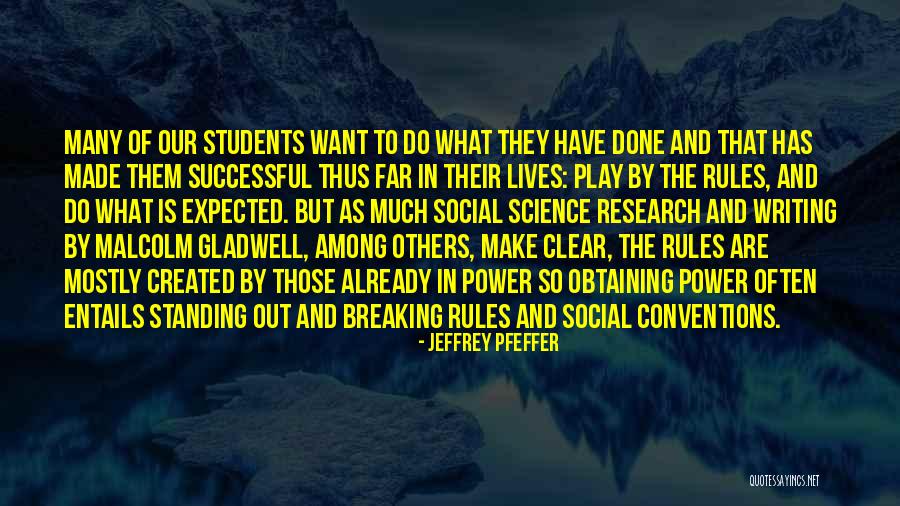
Many of our students want to do what they have done and that has made them successful thus far in their lives: play by the rules, and do what is expected. But as much social science research and writing by Malcolm Gladwell, among others, make clear, the rules are mostly created by those already in power so obtaining power often entails standing out and breaking rules and social conventions. — Jeffrey Pfeffer
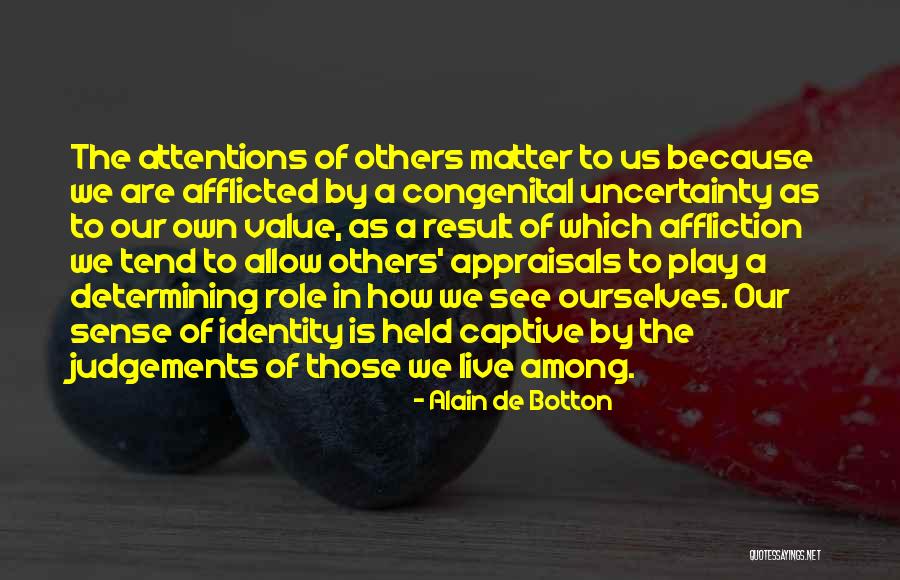
The attentions of others matter to us because we are afflicted by a congenital uncertainty as to our own value, as a result of which affliction we tend to allow others' appraisals to play a determining role in how we see ourselves. Our sense of identity is held captive by the judgements of those we live among. — Alain De Botton
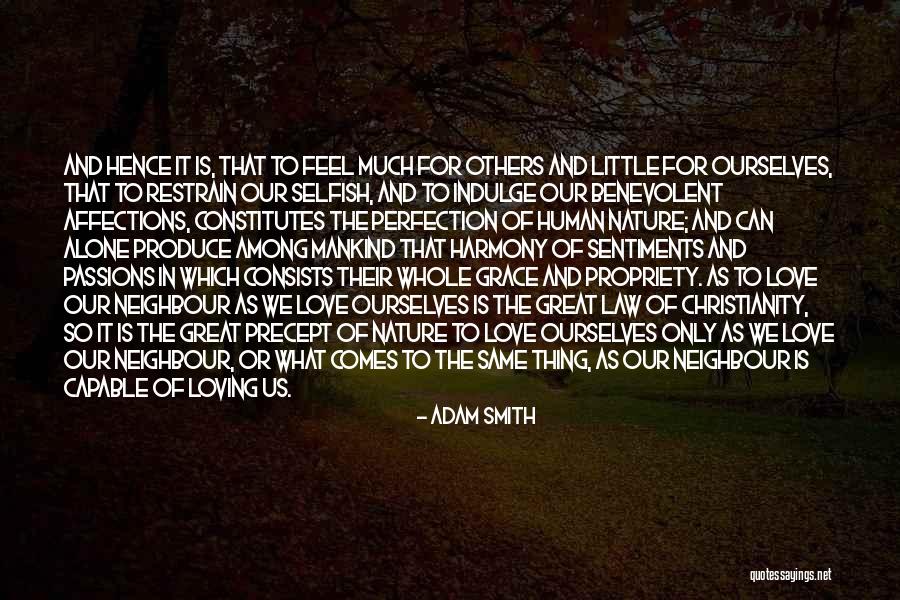
And hence it is, that to feel much for others and little for ourselves, that to restrain our selfish, and to indulge our benevolent affections, constitutes the perfection of human nature; and can alone produce among mankind that harmony of sentiments and passions in which consists their whole grace and propriety. As to love our neighbour as we love ourselves is the great law of Christianity, so it is the great precept of nature to love ourselves only as we love our neighbour, or what comes to the same thing, as our neighbour is capable of loving us. — Adam Smith
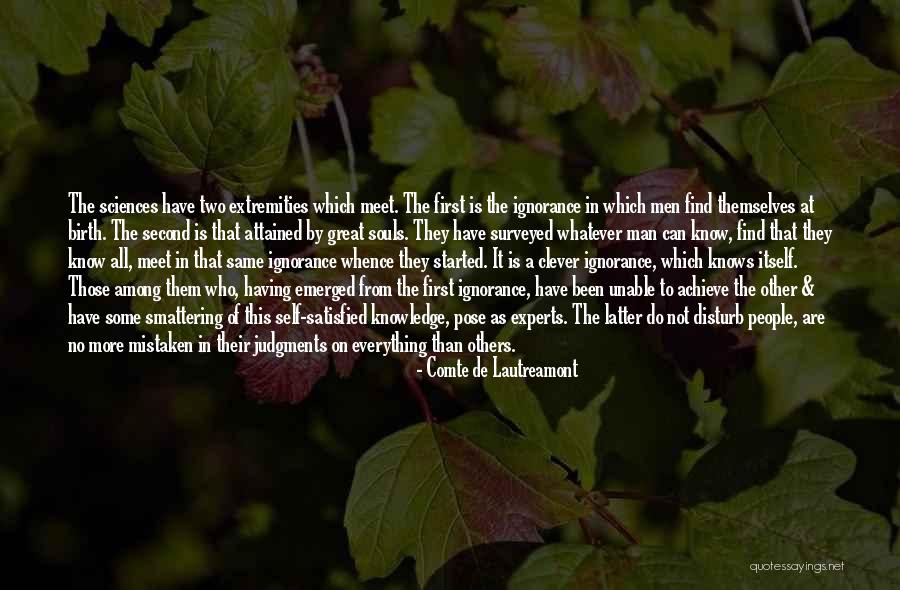
The sciences have two extremities which meet. The first is the ignorance in which men find themselves at birth. The second is that attained by great souls. They have surveyed whatever man can know, find that they know all, meet in that same ignorance whence they started. It is a clever ignorance, which knows itself. Those among them who, having emerged from the first ignorance, have been unable to achieve the other & have some smattering of this self-satisfied knowledge, pose as experts. The latter do not disturb people, are no more mistaken in their judgments on everything than others. The masses, the skilled, make up the retinue of a nation. The others, who respect it, are equally respected by it. — Comte De Lautreamont
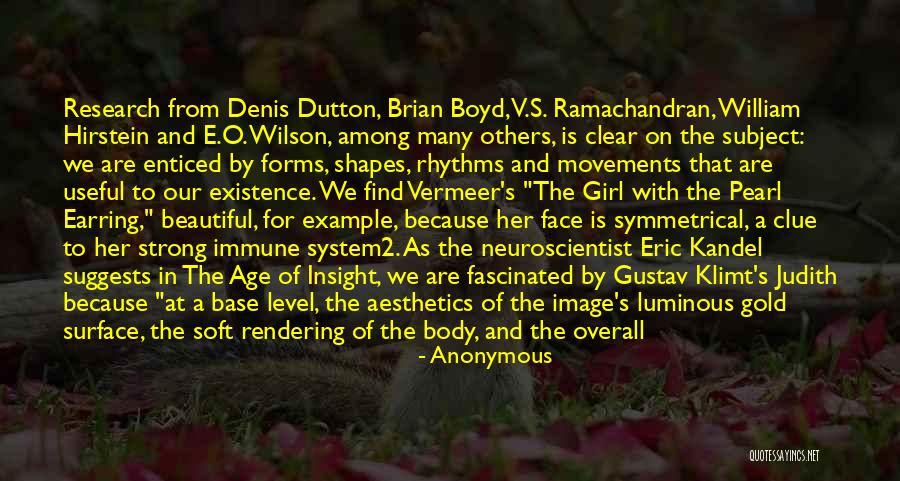
Research from Denis Dutton, Brian Boyd, V.S. Ramachandran, William Hirstein and E.O. Wilson, among many others, is clear on the subject: we are enticed by forms, shapes, rhythms and movements that are useful to our existence. We find Vermeer's "The Girl with the Pearl Earring," beautiful, for example, because her face is symmetrical, a clue to her strong immune system2. As the neuroscientist Eric Kandel suggests in The Age of Insight, we are fascinated by Gustav Klimt's Judith because "at a base level, the aesthetics of the image's luminous gold surface, the soft rendering of the body, and the overall harmonious combination of colors could activate the pleasure circuits, triggering the release of dopamine. If Judith's smooth skin and exposed breast trigger the release of endorphins, oxytocin, and vasopressin, one might feel sexual excitement. — Anonymous

What will remain is neither you nor me but what we shared among each others. — Santosh Kalwar
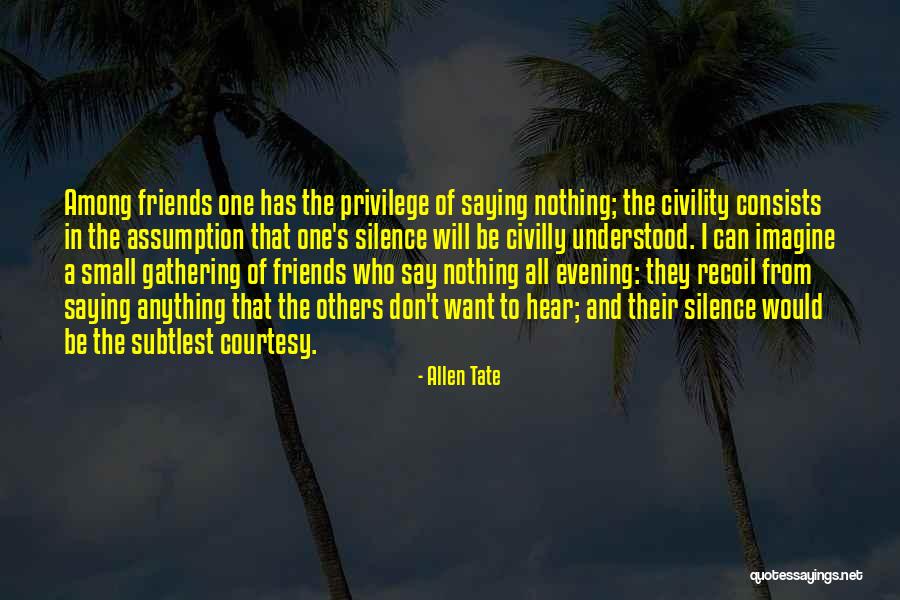
Among friends one has the privilege of saying nothing; the civility consists in the assumption that one's silence will be civilly understood. I can imagine a small gathering of friends who say nothing all evening: they recoil from saying anything that the others don't want to hear; and their silence would be the subtlest courtesy. — Allen Tate
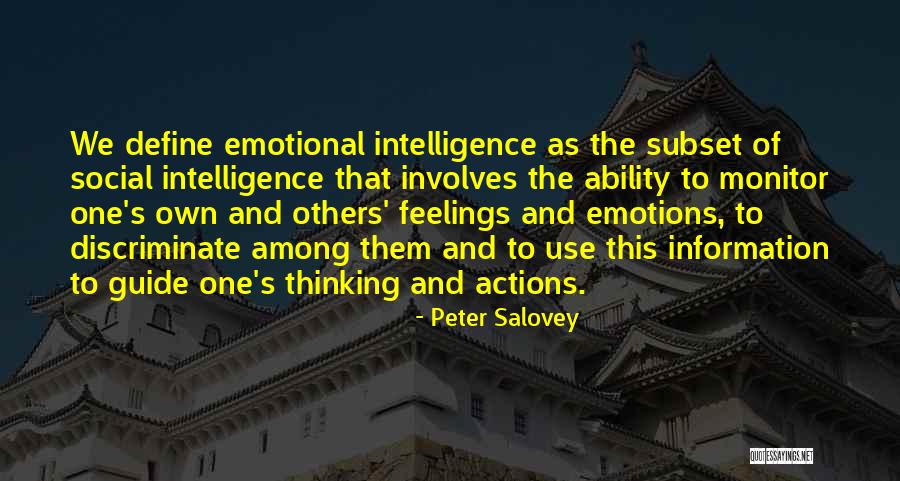
We define emotional intelligence as the subset of social intelligence that involves the ability to monitor one's own and others' feelings and emotions, to discriminate among them and to use this information to guide one's thinking and actions. — Peter Salovey
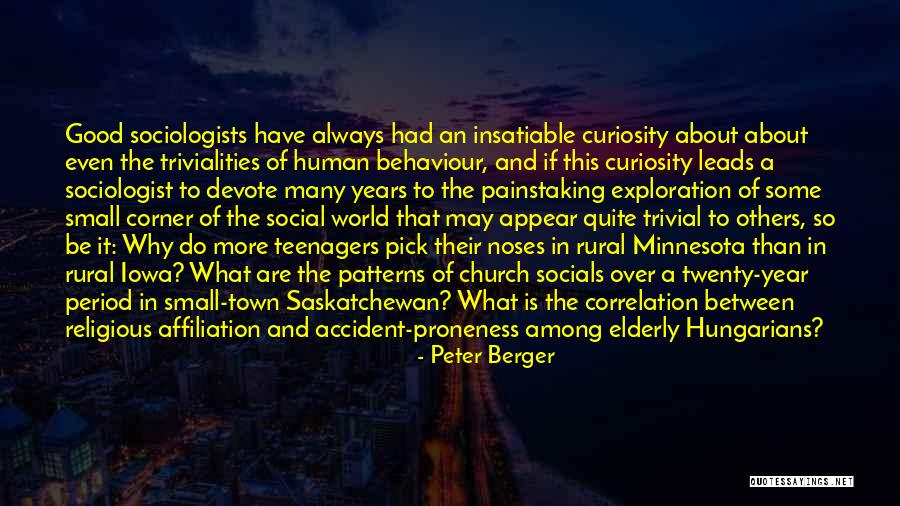
Good sociologists have always had an insatiable curiosity about about even the trivialities of human behaviour, and if this curiosity leads a sociologist to devote many years to the painstaking exploration of some small corner of the social world that may appear quite trivial to others, so be it: Why do more teenagers pick their noses in rural Minnesota than in rural Iowa? What are the patterns of church socials over a twenty-year period in small-town Saskatchewan? What is the correlation between religious affiliation and accident-proneness among elderly Hungarians? — Peter Berger
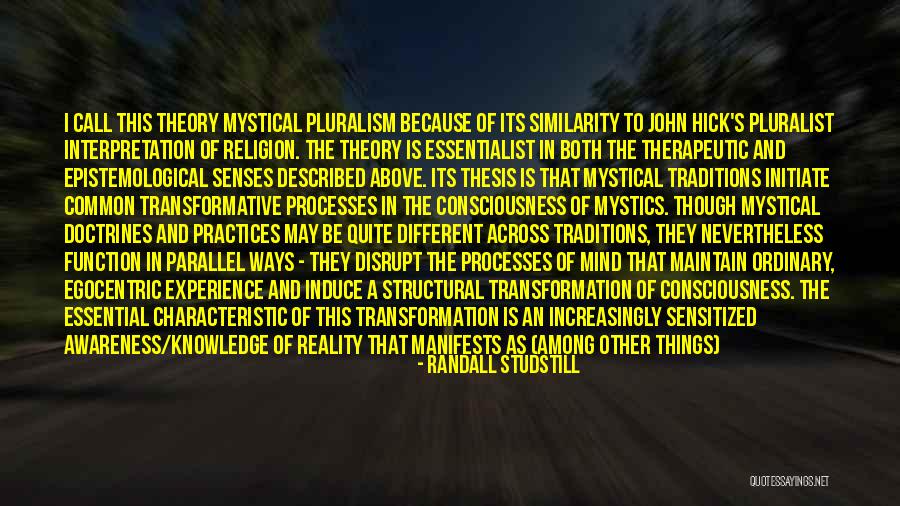
I call this theory mystical pluralism because of its similarity to John Hick's pluralist interpretation of religion. The theory is essentialist in both the therapeutic and epistemological senses described above. Its thesis is that mystical traditions initiate common transformative processes in the consciousness of mystics. Though mystical doctrines and practices may be quite different across traditions, they nevertheless function in parallel ways - they disrupt the processes of mind that maintain ordinary, egocentric experience and induce a structural transformation of consciousness. The essential characteristic of this transformation is an increasingly sensitized awareness/knowledge of Reality that manifests as (among other things) an enhanced sense of emotional well-being, an expanded locus of concern engendering greater compassion for others, an enhanced capacity to creatively negotiate one's environment, and a greater capacity for aesthetic appreciation. — Randall Studstill

But there are others of my kind ... those who see themselves as lions among sheep. As kings
superior to man in every way. Why, then, should they be confined to darkness? Why should they fear man? — Seth Grahame-Smith
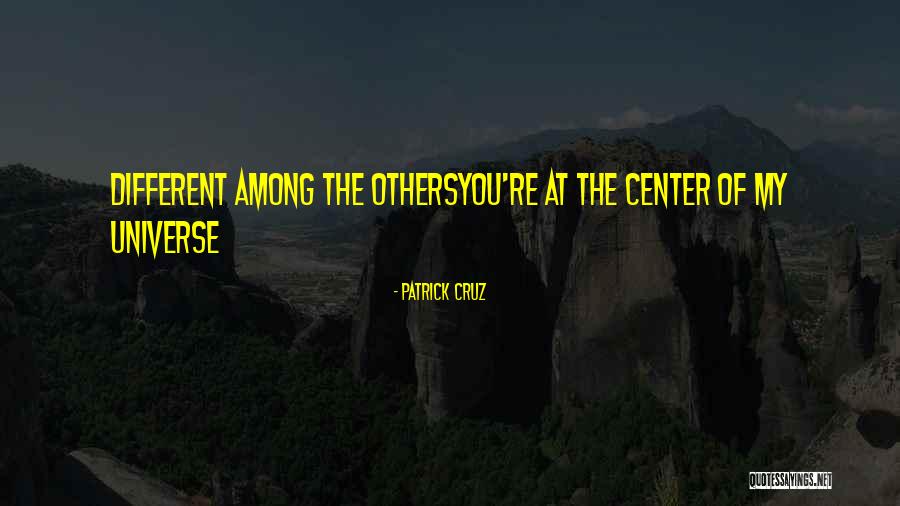
Different among the others
You're at the center of my universe — Patrick Cruz
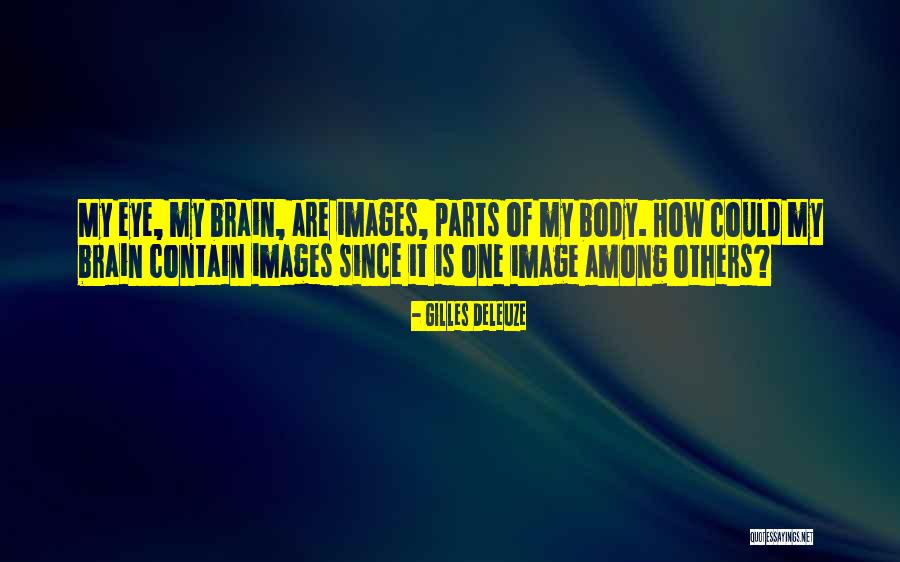
My eye, my brain, are images, parts of my body. How could my brain contain images since it is one image among others? — Gilles Deleuze
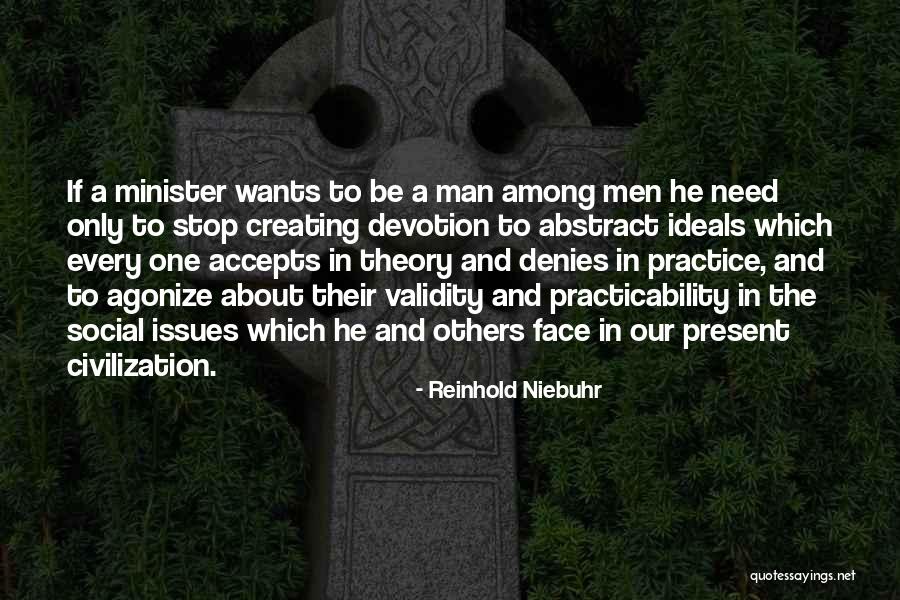
If a minister wants to be a man among men he need only to stop creating devotion to abstract ideals which every one accepts in theory and denies in practice, and to agonize about their validity and practicability in the social issues which he and others face in our present civilization. — Reinhold Niebuhr
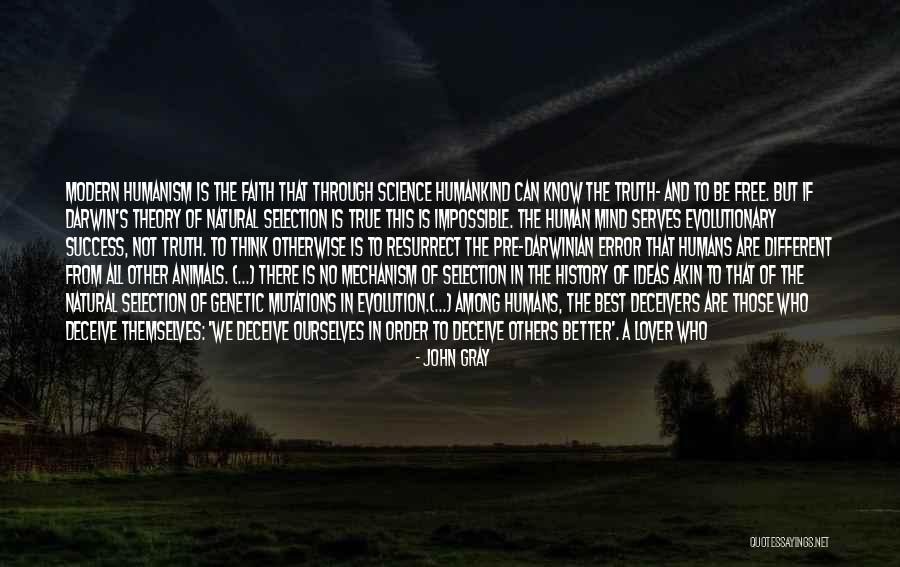
Modern humanism is the faith that through science humankind can know the truth- and to be free. But if Darwin's theory of natural selection is true this is impossible. The human mind serves evolutionary success, not truth. To think otherwise is to resurrect the pre-Darwinian error that humans are different from all other animals. (...) There is no mechanism of selection in the history of ideas akin to that of the natural selection of genetic mutations in evolution.(...) Among humans, the best deceivers are those who deceive themselves: 'we deceive ourselves in order to deceive others better'. A lover who promises eternal fidelity s more likely to be believed if he believes his promise himself; he is no more likely to keep his promise.(...) In a competition for mates, a well-developed capacity for self-deception is an advantage. — John Gray
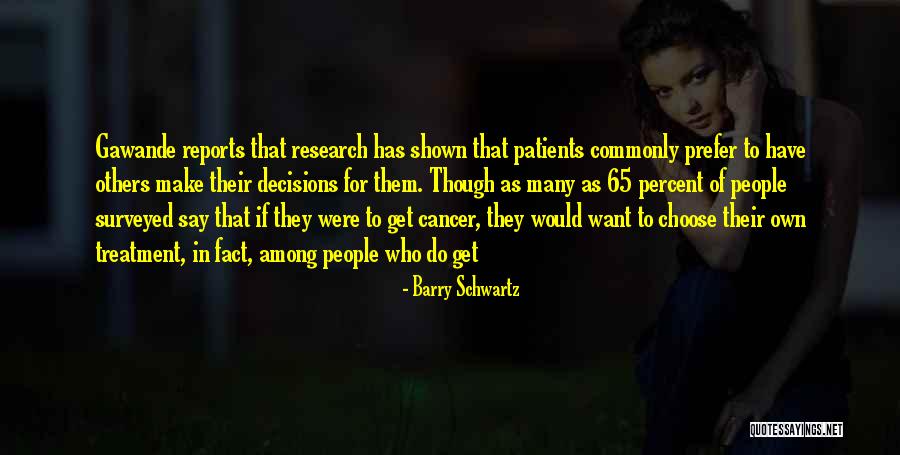
Gawande reports that research has shown that patients commonly prefer to have others make their decisions for them. Though as many as 65 percent of people surveyed say that if they were to get cancer, they would want to choose their own treatment, in fact, among people who do get — Barry Schwartz
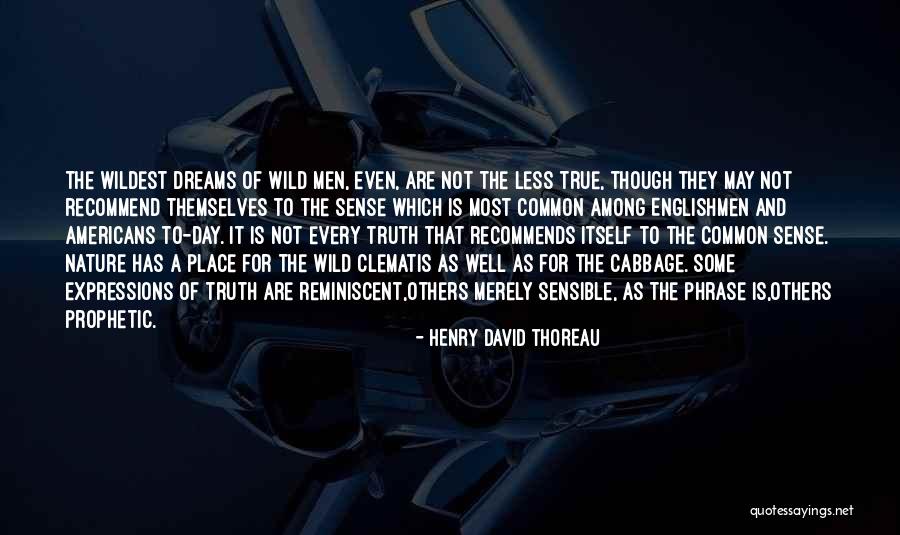
The wildest dreams of wild men, even, are not the less true, though they may not recommend themselves to the sense which is most common among Englishmen and Americans to-day. It is not every truth that recommends itself to the common sense. Nature has a place for the wild clematis as well as for the cabbage. Some expressions of truth are reminiscent,
others merely sensible, as the phrase is,
others prophetic. — Henry David Thoreau
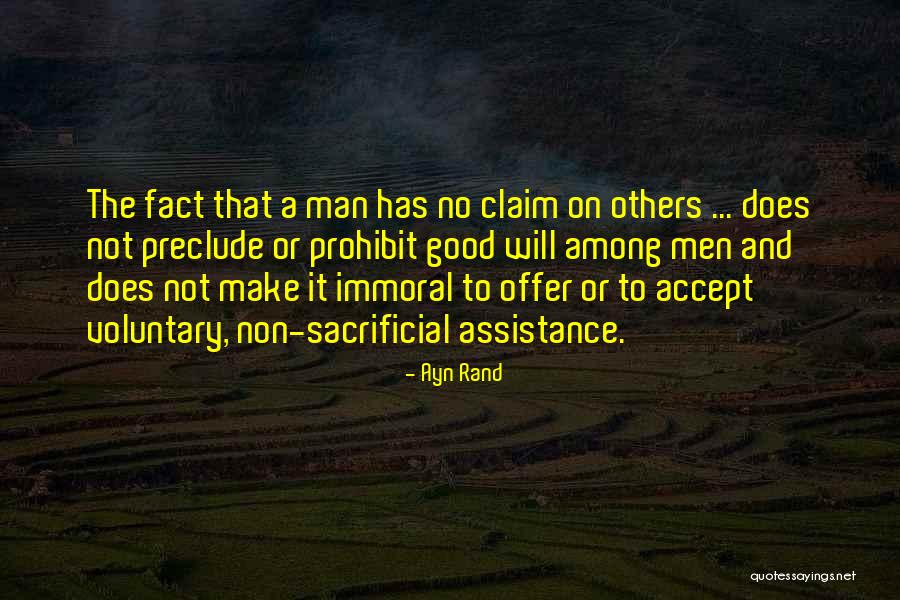
The fact that a man has no claim on others ... does not preclude or prohibit good will among men and does not make it immoral to offer or to accept voluntary, non-sacrificial assistance. — Ayn Rand
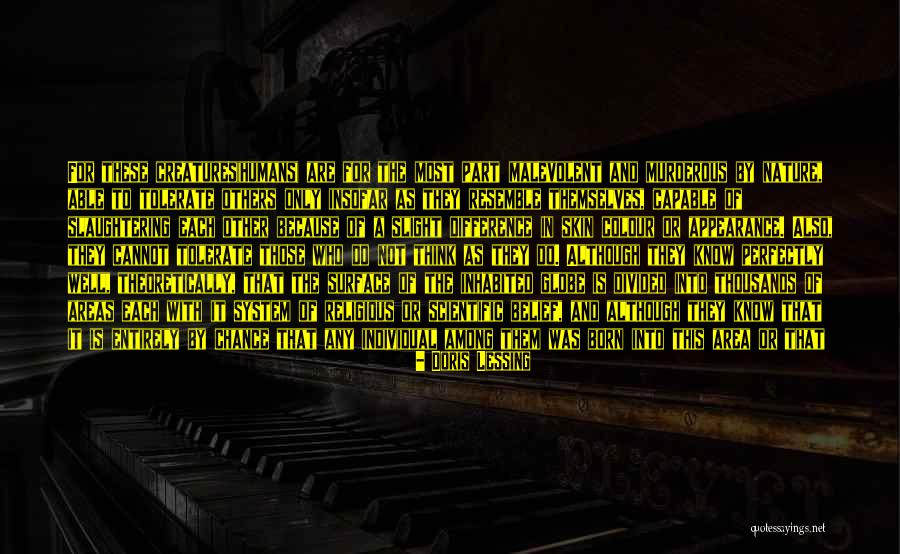
For these creatures(humans) are for the most part malevolent and murderous by nature, able to tolerate others only insofar as they resemble themselves, capable of slaughtering each other because of a slight difference in skin colour or appearance. Also, they cannot tolerate those who do not think as they do. Although they know perfectly well, theoretically, that the surface of the inhabited globe is divided into thousands of areas each with it system of religious or scientific belief, and although they know that it is entirely by chance that any individual among them was born into this area or that area, this or that area of belief, this theoretical knowledge does not prevent them from hating foreigners in their own particular small area, and if not harming them, isolating them in every way possible. — Doris Lessing

Julia Bliss Flaherty, as Ivy now realized, was of the same stripe. Pinned down and obliged to justify herself, she would explain her actions in terms of some altruistic plan. And she might even believe it. But it wasn't that at all. She was like Ivy's grandmother. If you paid fealty to her, she would favor you, and your reputation and power would grow among all the others who did likewise. — Neal Stephenson
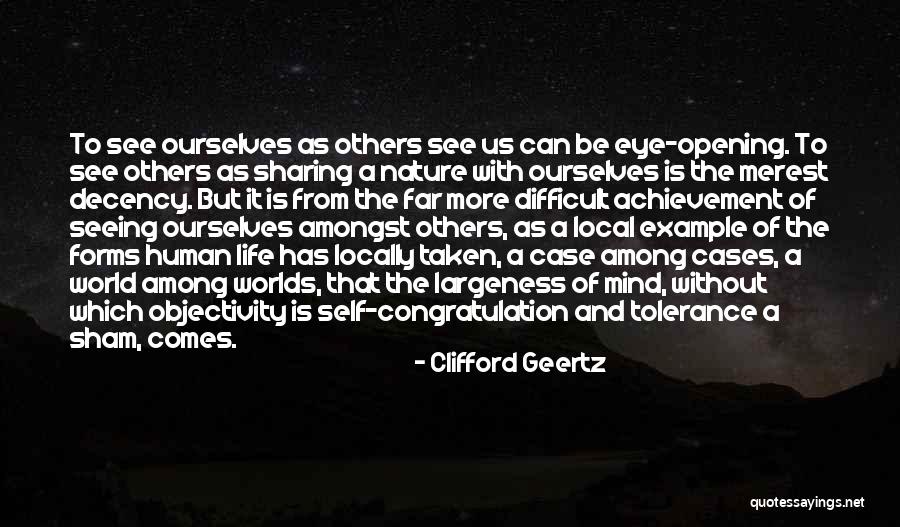
To see ourselves as others see us can be eye-opening. To see others as sharing a nature with ourselves is the merest decency. But it is from the far more difficult achievement of seeing ourselves amongst others, as a local example of the forms human life has locally taken, a case among cases, a world among worlds, that the largeness of mind, without which objectivity is self-congratulation and tolerance a sham, comes. — Clifford Geertz
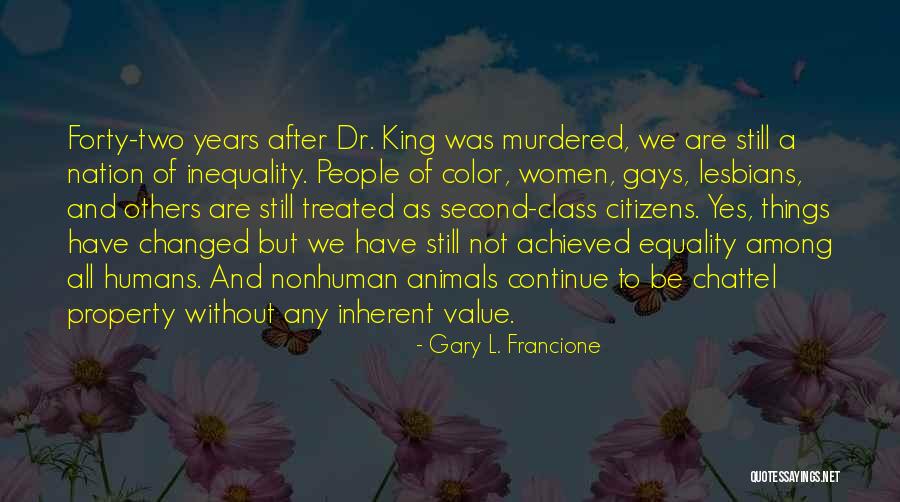
Forty-two years after Dr. King was murdered, we are still a nation of inequality. People of color, women, gays, lesbians, and others are still treated as second-class citizens. Yes, things have changed but we have still not achieved equality among all humans. And nonhuman animals continue to be chattel property without any inherent value. — Gary L. Francione
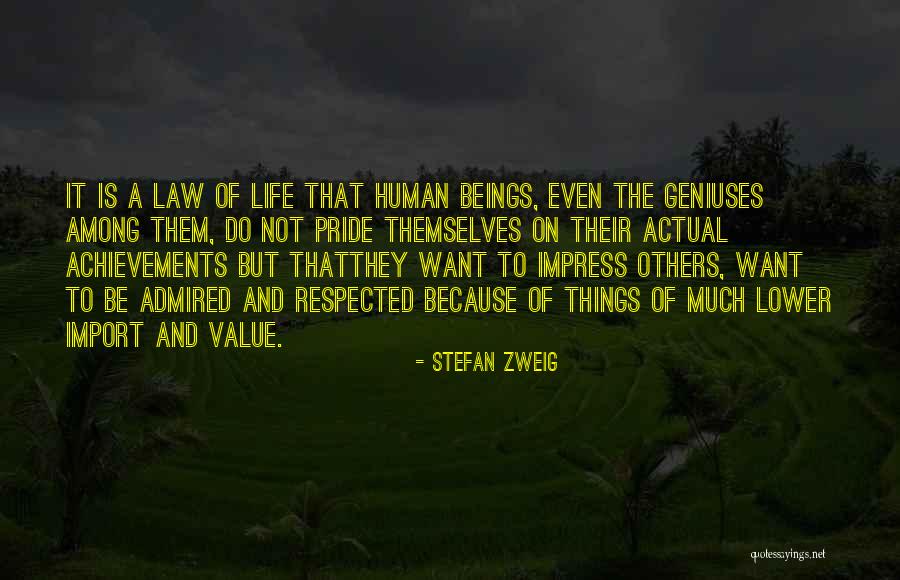
It is a law of life that human beings, even the geniuses among them, do not pride themselves on their actual achievements but thatthey want to impress others, want to be admired and respected because of things of much lower import and value. — Stefan Zweig
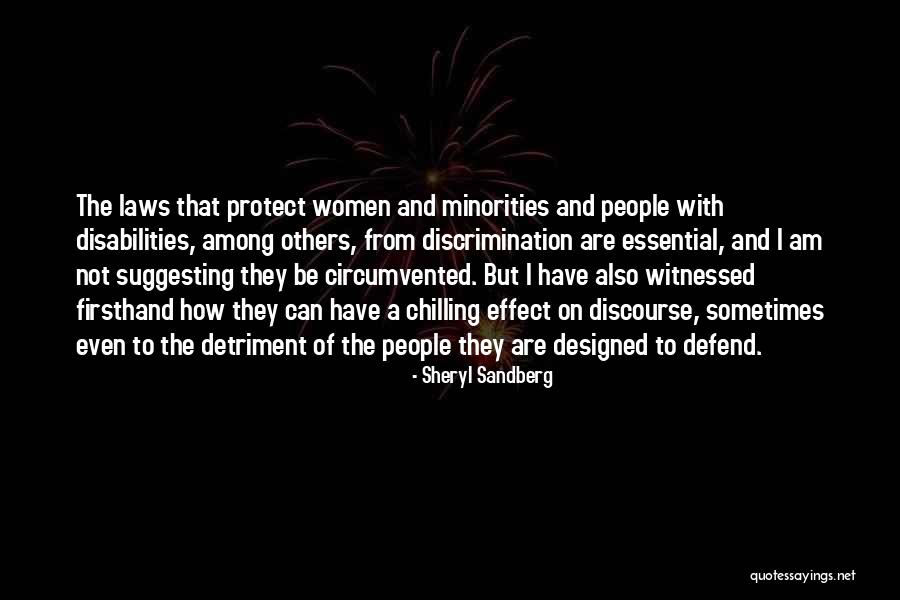
The laws that protect women and minorities and people with disabilities, among others, from discrimination are essential, and I am not suggesting they be circumvented. But I have also witnessed firsthand how they can have a chilling effect on discourse, sometimes even to the detriment of the people they are designed to defend. — Sheryl Sandberg
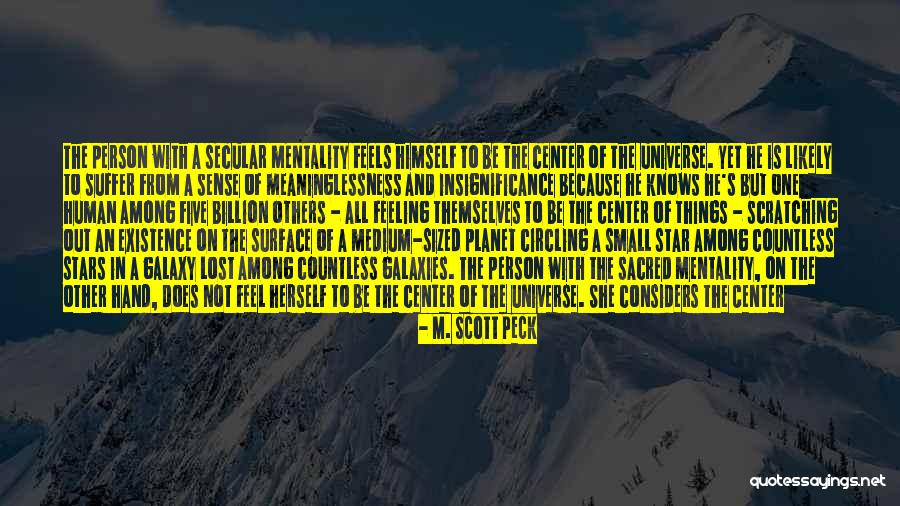
The person with a secular mentality feels himself to be the center of the universe. Yet he is likely to suffer from a sense of meaninglessness and insignificance because he knows he's but one human among five billion others - all feeling themselves to be the center of things - scratching out an existence on the surface of a medium-sized planet circling a small star among countless stars in a galaxy lost among countless galaxies. The person with the sacred mentality, on the other hand, does not feel herself to be the center of the universe. She considers the Center to be elsewhere and other. Yet she is unlikely to feel lost or insignificant precisely because she draws her significance and meaning from her relationship, her connection, with that center, that Other. — M. Scott Peck
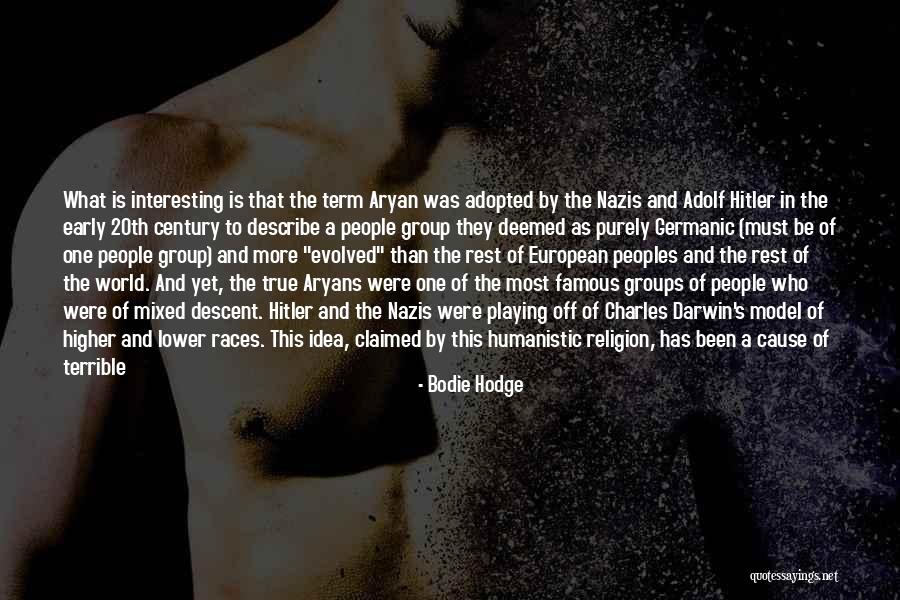
What is interesting is that the term Aryan was adopted by the Nazis and Adolf Hitler in the early 20th century to describe a people group they deemed as purely Germanic (must be of one people group) and more "evolved" than the rest of European peoples and the rest of the world. And yet, the true Aryans were one of the most famous groups of people who were of mixed descent. Hitler and the Nazis were playing off of Charles Darwin's model of higher and lower races. This idea, claimed by this humanistic religion, has been a cause of terrible atrocities in WWI, WWII, and mass exterminations of people by leaders like Stalin (Soviet Union) and Mao (China), among others. — Bodie Hodge
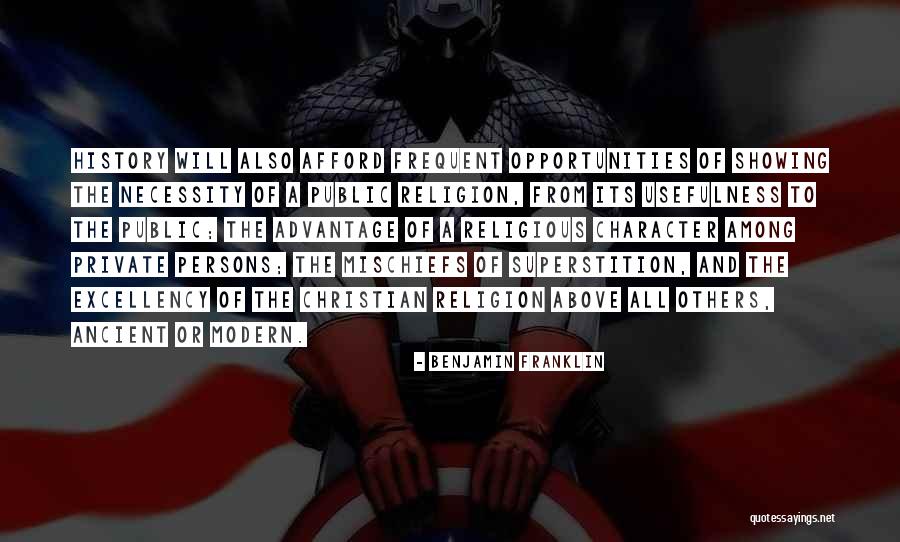
History will also afford frequent opportunities of showing the necessity of a public religion, from its usefulness to the public; the advantage of a religious character among private persons; the mischiefs of superstition, and the excellency of the Christian religion above all others, ancient or modern. — Benjamin Franklin

Sam Temple was taken by helicopter to a hospital in Los Angeles, where there were specialists there in burn injuries. He wasn't consulted: he was found on his knees, obviously in shock, extensively burned. EMTs took over.
Astrid Ellison was taken to a hospital in Santa Barbara, as was Diana Ladris.
Other kids were shared out among half a dozen hospitals. Some specialized in plastic surgery, others in the effects of starvation.
Over the next week all were seen by psychiatrists once their immediate physical injuries were addressed. Lots of psychiatrists. And when they weren't being seen by psychiatrists, they were being seen by FBI agents, and California Highway Patrol investigators, and lawyers from the district attorney's office.
The consensus seemed to be that a number of the Perdido survivors, as they were now known, would be prosecuted for crimes ranging from simple assault to murder.
First on that list was Sam Temple. — Michael Grant

I will admit, I once launched myself at Julie Garwood for a hug, hoping some of her magic would rub off on me ... and I have fangirl crushes on Susan Elizabeth Phillips, Linda Howard, and Kresley Cole, among many others. — Lisa Kleypas
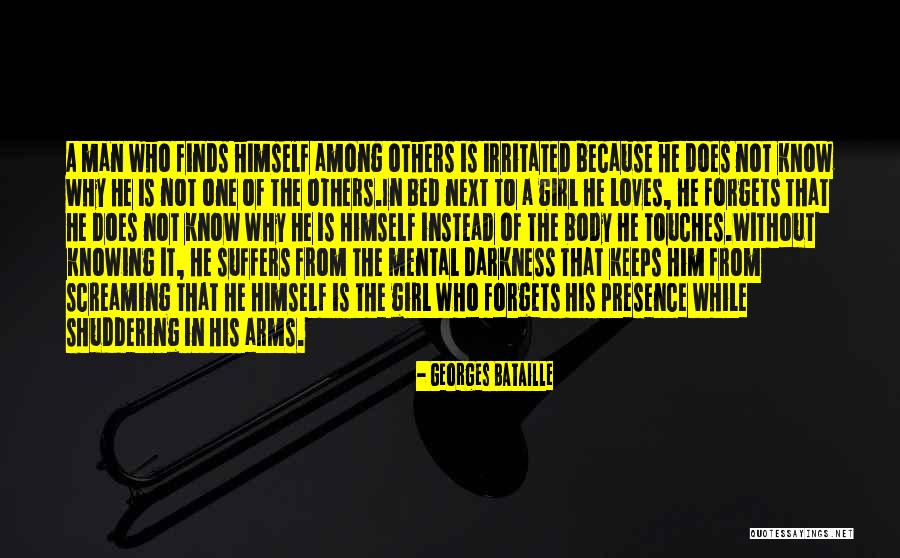
A man who finds himself among others is irritated because he does not know why he is not one of the others.
In bed next to a girl he loves, he forgets that he does not know why he is himself instead of the body he touches.
Without knowing it, he suffers from the mental darkness that keeps him from screaming that he himself is the girl who forgets his presence while shuddering in his arms. — Georges Bataille
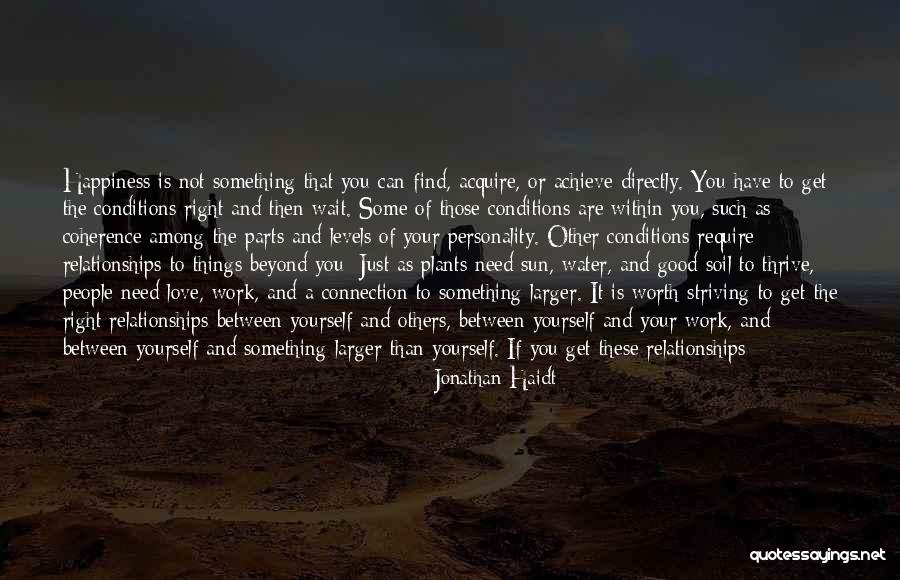
Happiness is not something that you can find, acquire, or achieve directly. You have to get the conditions right and then wait. Some of those conditions are within you, such as coherence among the parts and levels of your personality. Other conditions require relationships to things beyond you: Just as plants need sun, water, and good soil to thrive, people need love, work, and a connection to something larger. It is worth striving to get the right relationships between yourself and others, between yourself and your work, and between yourself and something larger than yourself. If you get these relationships right, a sense of purpose and meaning will emerge. — Jonathan Haidt
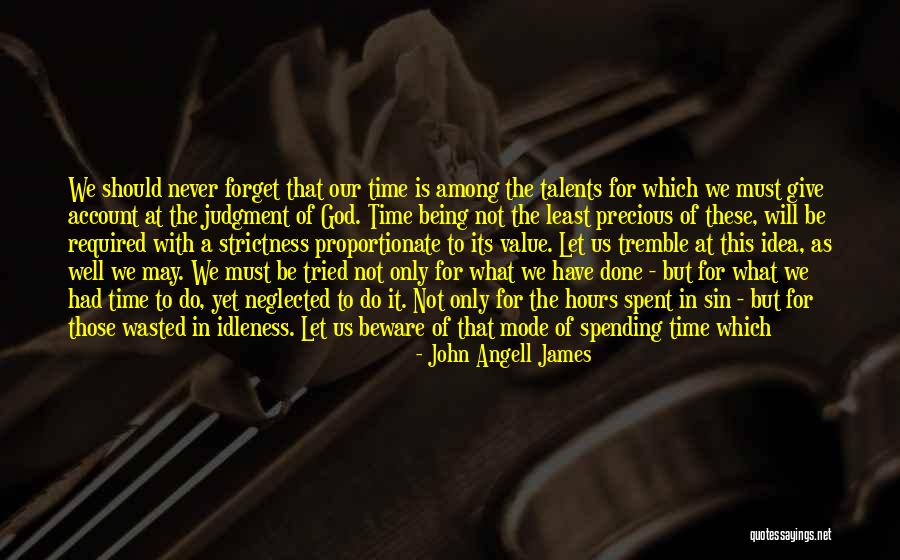
We should never forget that our time is among the talents for which we must give account at the judgment of God. Time being not the least precious of these, will be required with a strictness proportionate to its value. Let us tremble at this idea, as well we may. We must be tried not only for what we have done - but for what we had time to do, yet neglected to do it. Not only for the hours spent in sin - but for those wasted in idleness. Let us beware of that mode of spending time which some call killing it, for this murder,like others, will not always be concealed - the hours destroyed in secret will appear when we least expect it, to the unspeakable terror and amazement of our souls - they arise from the dead, and fly away to heaven, where they might have carried better news, and there tell sad tales of us, which we shall be sure to hear of again, when we hold up our hands at the bar, and they shall come as so many swift witnesses against us! — John Angell James
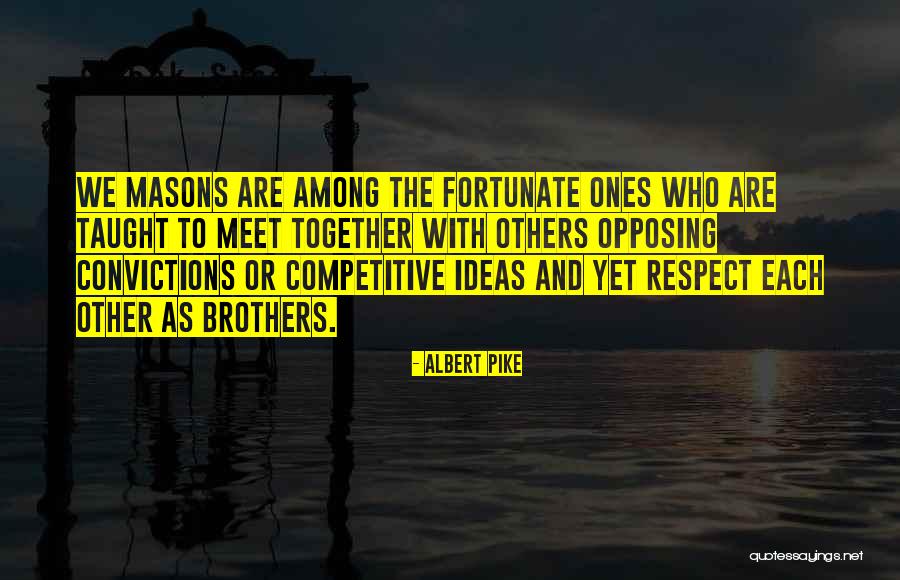
We Masons are among the fortunate ones who are taught to meet together with others opposing convictions or competitive ideas and yet respect each other as Brothers. — Albert Pike
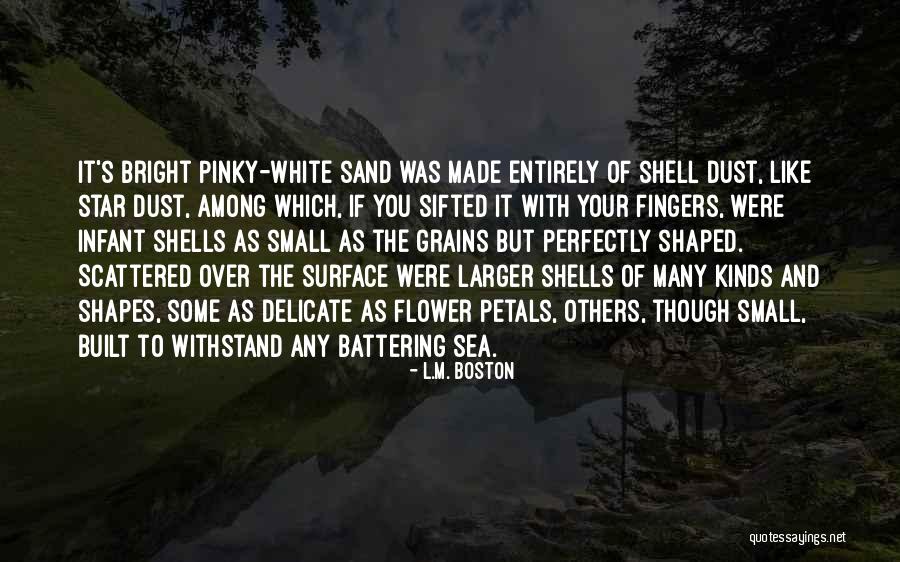
It's bright pinky-white sand was made entirely of shell dust, like star dust, among which, if you sifted it with your fingers, were infant shells as small as the grains but perfectly shaped. Scattered over the surface were larger shells of many kinds and shapes, some as delicate as flower petals, others, though small, built to withstand any battering sea. — L.M. Boston
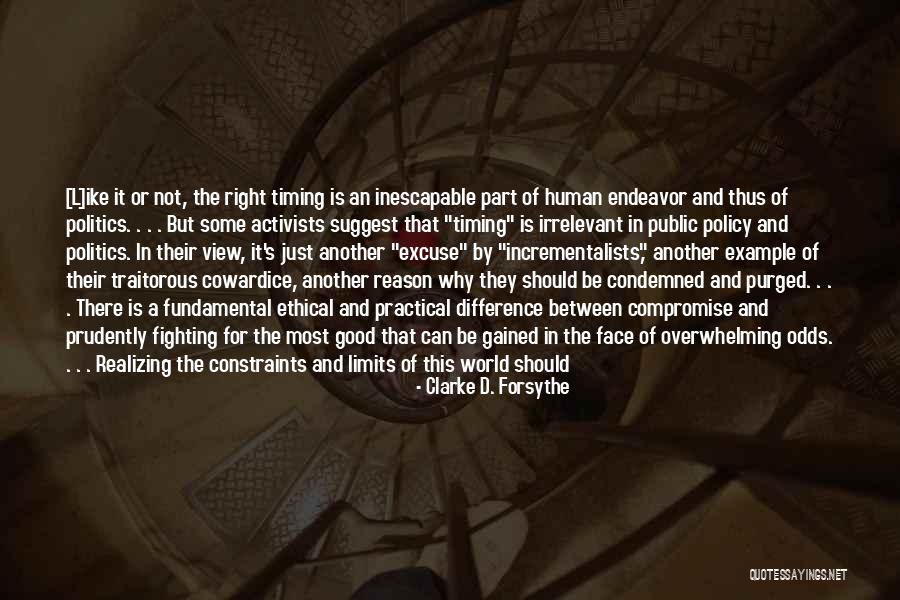
[L]ike it or not, the right timing is an inescapable part of human endeavor and thus of politics. . . . But some activists suggest that "timing" is irrelevant in public policy and politics. In their view, it's just another "excuse" by "incrementalists," another example of their traitorous cowardice, another reason why they should be condemned and purged. . . . There is a fundamental ethical and practical difference between compromise and prudently fighting for the most good that can be gained in the face of overwhelming odds. . . . Realizing the constraints and limits of this world should guard us against unrealistic expectations of what politics can or should achieve. And yet, the examples of Wilberforce and Lincoln, among many others, demonstrate that moral purpose can be successfully pursued in politics with prudence. — Clarke D. Forsythe
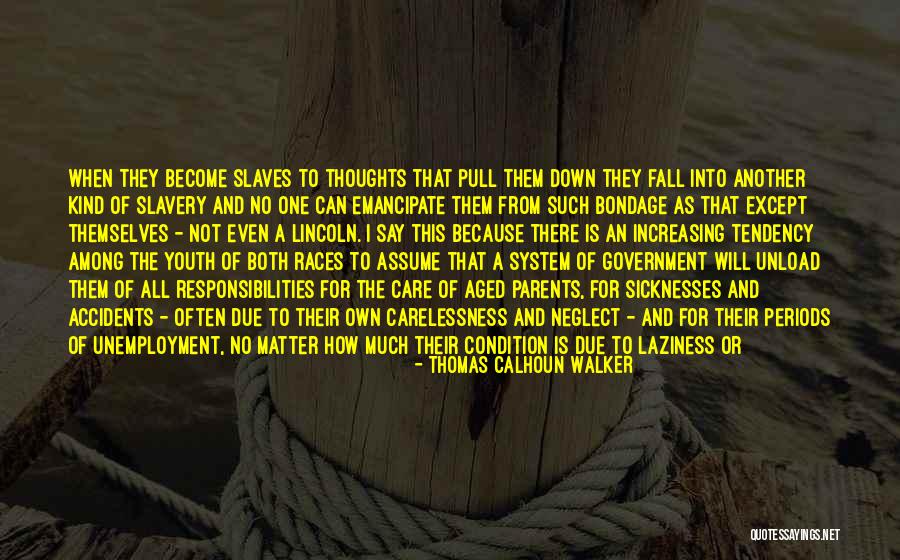
When they become slaves to thoughts that pull them down they fall into another kind of slavery and no one can emancipate them from such bondage as that except themselves - not even a Lincoln.
I say this because there is an increasing tendency among the youth of both races to assume that a system of government will unload them of all responsibilities for the care of aged parents, for sicknesses and accidents - often due to their own carelessness and neglect - and for their periods of unemployment, no matter how much their condition is due to laziness or failure to co-operate with others. I see this every day. 'Let the government do it,' they say, ignoring the fact that, in a democracy, they themselves help pay for the government's disbursements. It looks to me at this time as if they wish to declare not their independence, but their dependence upon the government from the cradle to the grave. — Thomas Calhoun Walker
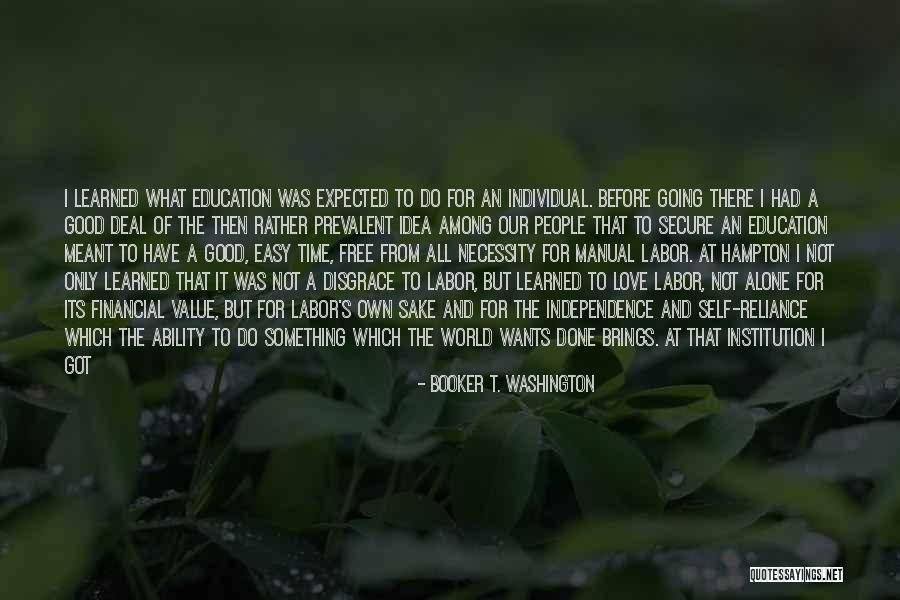
I learned what education was expected to do for an individual. Before going there I had a good deal of the then rather prevalent idea among our people that to secure an education meant to have a good, easy time, free from all necessity for manual labor. At Hampton I not only learned that it was not a disgrace to labor, but learned to love labor, not alone for its financial value, but for labor's own sake and for the independence and self-reliance which the ability to do something which the world wants done brings. At that institution I got my first taste of what it meant to live a life of unselfishness, my first knowledge of the fact that the happiest individuals are those who do the most to make others useful and happy. — Booker T. Washington
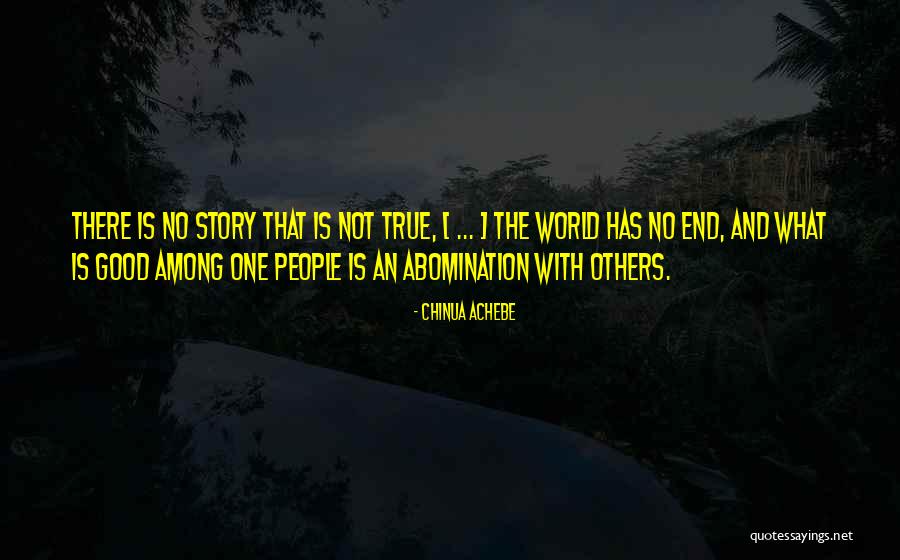
There is no story that is not true, [ ... ] The world has no end, and what is good among one people is an abomination with others. — Chinua Achebe
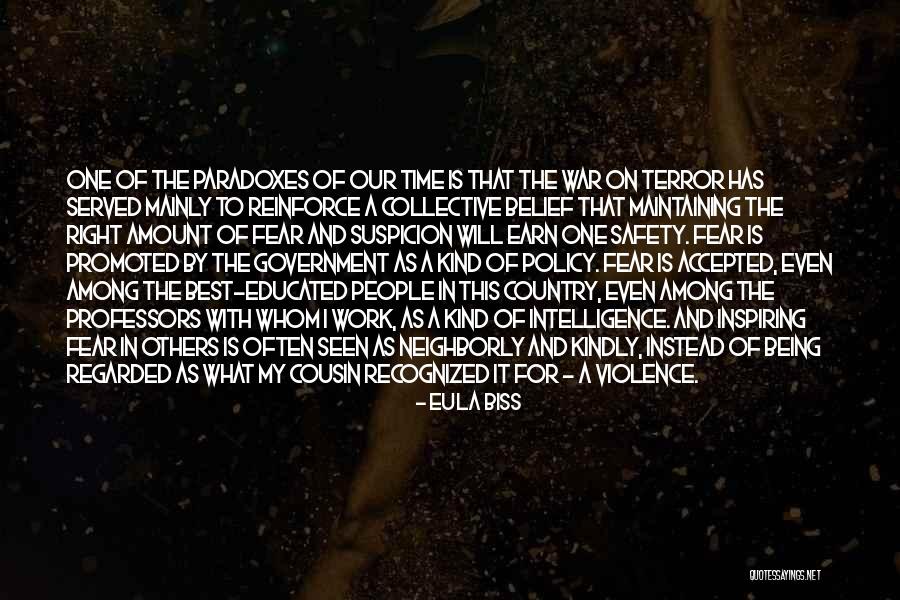
One of the paradoxes of our time is that the War on Terror has served mainly to reinforce a collective belief that maintaining the right amount of fear and suspicion will earn one safety. Fear is promoted by the government as a kind of policy. Fear is accepted, even among the best-educated people in this country, even among the professors with whom I work, as a kind of intelligence. And inspiring fear in others is often seen as neighborly and kindly, instead of being regarded as what my cousin recognized it for - a violence. — Eula Biss
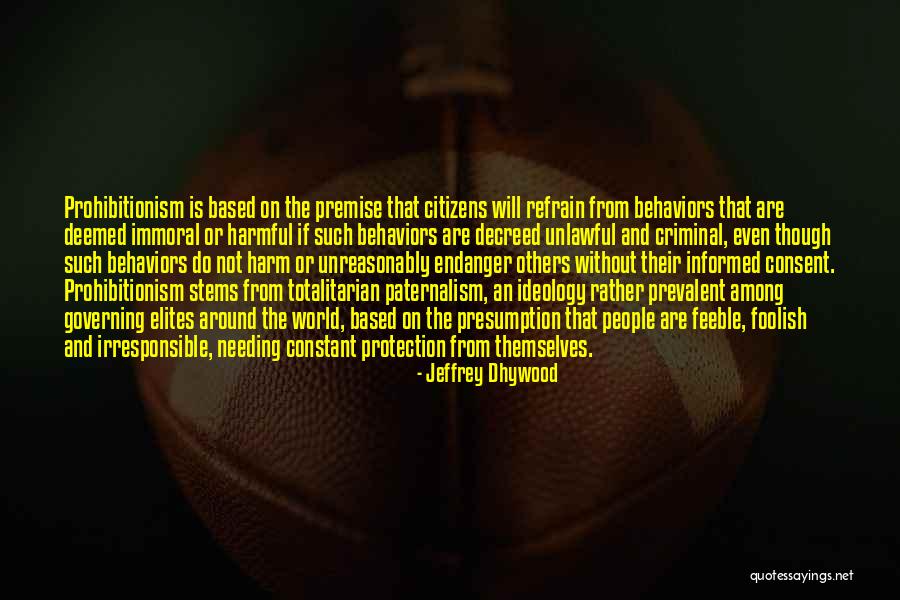
Prohibitionism is based on the premise that citizens will refrain from behaviors that are deemed immoral or harmful if such behaviors are decreed unlawful and criminal, even though such behaviors do not harm or unreasonably endanger others without their informed consent. Prohibitionism stems from totalitarian paternalism, an ideology rather prevalent among governing elites around the world, based on the presumption that people are feeble, foolish and irresponsible, needing constant protection from themselves. — Jeffrey Dhywood
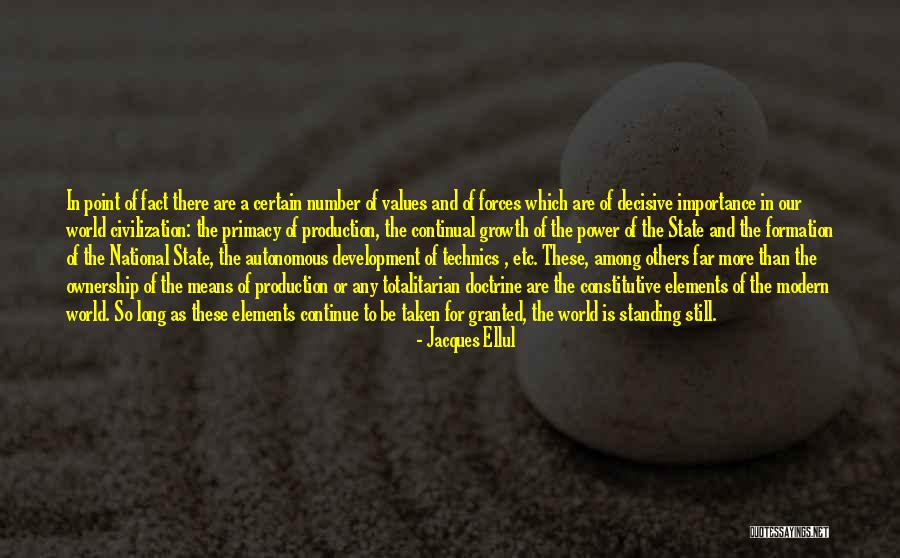
In point of fact there are a certain number of values and of forces which are of decisive importance in our world civilization: the primacy of production, the continual growth of the power of the State and the formation of the National State, the autonomous development of technics , etc. These, among others far more than the ownership of the means of production or any totalitarian doctrine are the constitutive elements of the modern world. So long as these elements continue to be taken for granted, the world is standing still. — Jacques Ellul
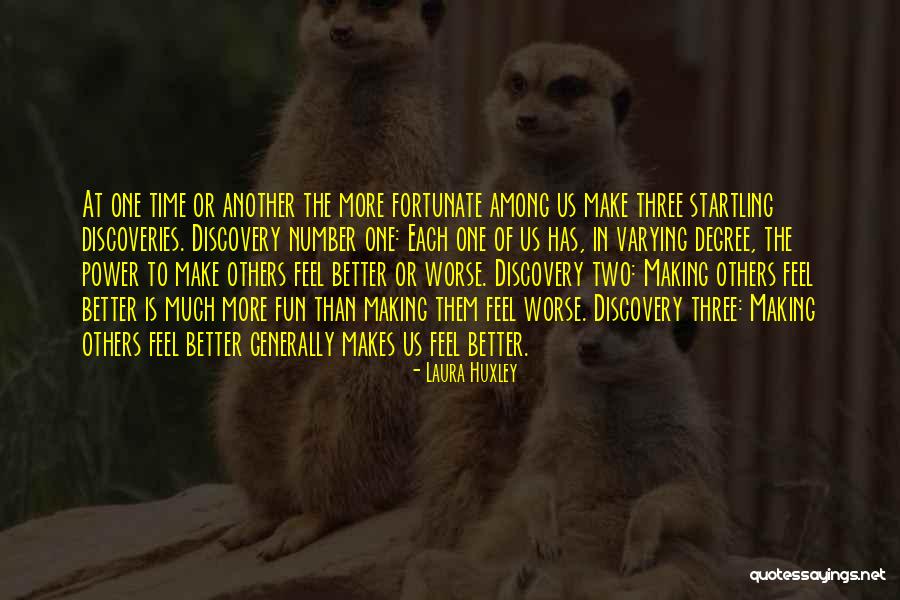
At one time or another the more fortunate among us make three startling discoveries. Discovery number one: Each one of us has, in varying degree, the power to make others feel better or worse. Discovery two: Making others feel better is much more fun than making them feel worse. Discovery three: Making others feel better generally makes us feel better. — Laura Huxley
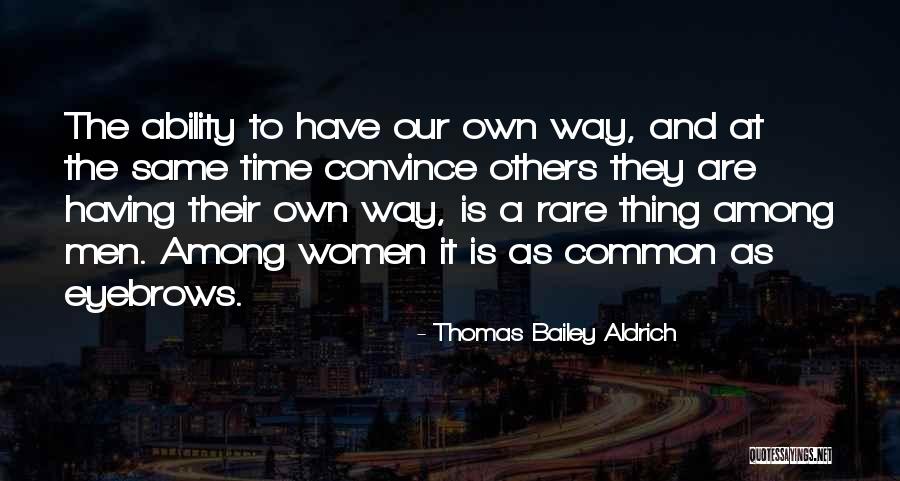
The ability to have our own way, and at the same time convince others they are having their own way, is a rare thing among men. Among women it is as common as eyebrows. — Thomas Bailey Aldrich

Methods of detoxifying and processing plants for human use are known throughout the world, and include a variety of techniques, including dehydration, application of heat, leaching, and fermentation, among others (Johns and Kubo 1988). While it is difficult to trace the origins of these methods, or to answer the questions of how certain groups learned to detoxify and process useful plants in their environment, to make a blanket claim that certain cultures were incapable of discovering plant properties, and the methods necessary for rendering them same and useful, seems naive at best. — John Rush
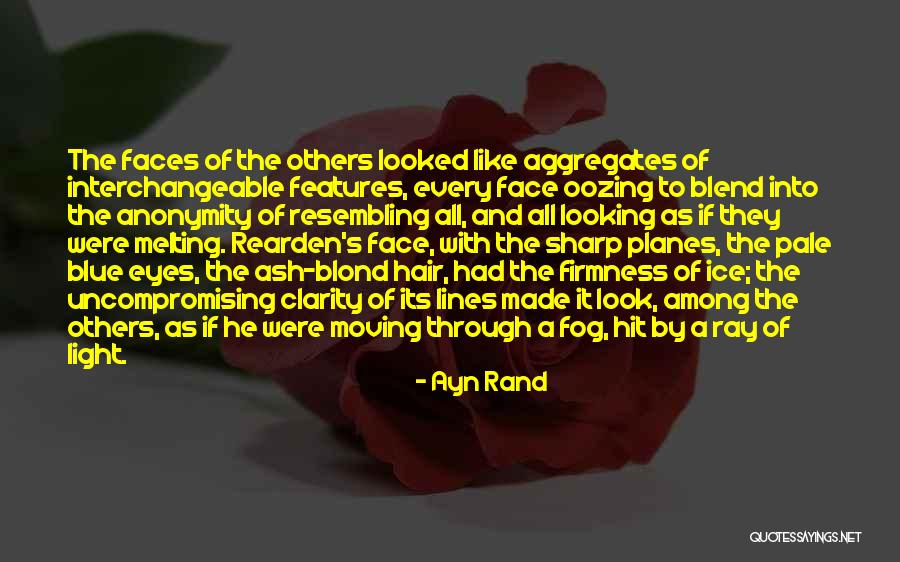
The faces of the others looked like aggregates of interchangeable features, every face oozing to blend into the anonymity of resembling all, and all looking as if they were melting. Rearden's face, with the sharp planes, the pale blue eyes, the ash-blond hair, had the firmness of ice; the uncompromising clarity of its lines made it look, among the others, as if he were moving through a fog, hit by a ray of light. — Ayn Rand
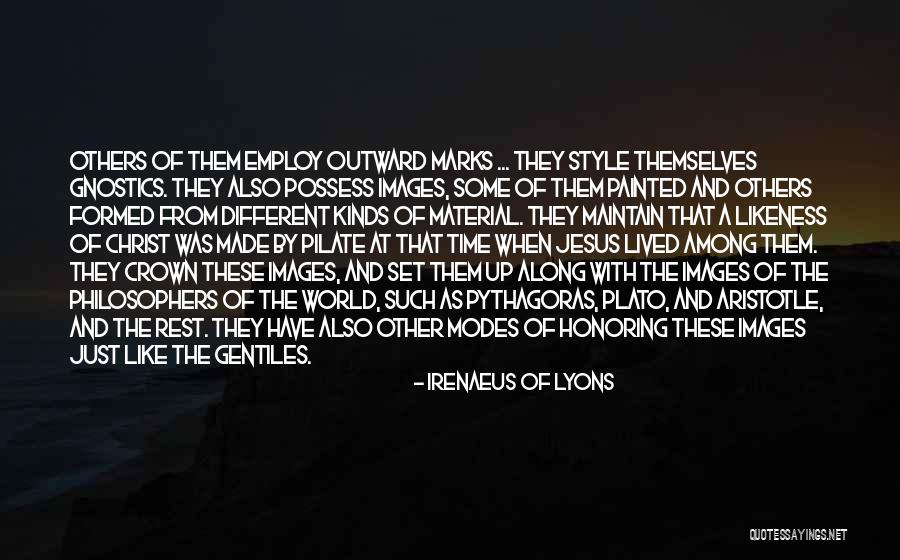
Others of them employ outward marks ... They style themselves Gnostics. They also possess images, some of them painted and others formed from different kinds of material. They maintain that a likeness of Christ was made by Pilate at that time when Jesus lived among them. They crown these images, and set them up along with the images of the philosophers of the world, such as Pythagoras, Plato, and Aristotle, and the rest. They have also other modes of honoring these images just like the Gentiles. — Irenaeus Of Lyons
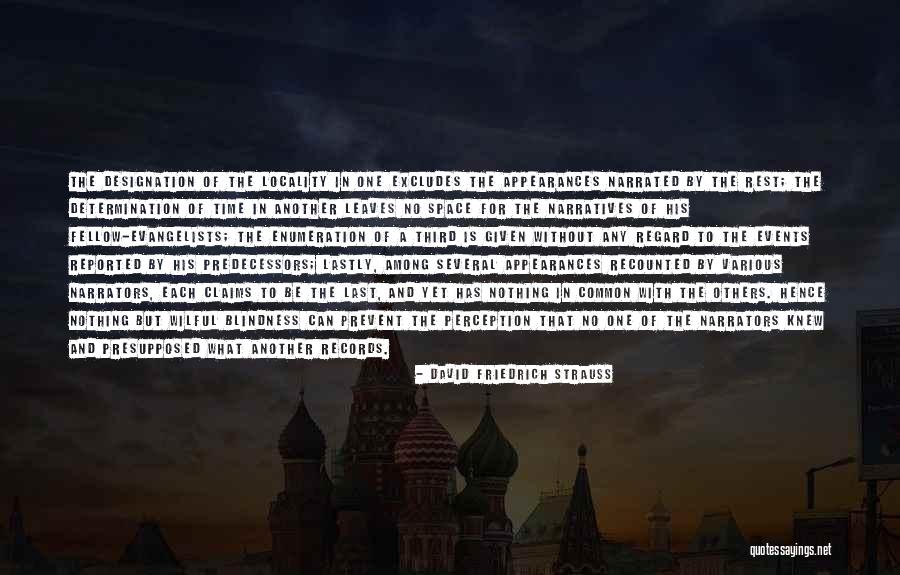
The designation of the locality in one excludes the appearances narrated by the rest; the determination of time in another leaves no space for the narratives of his fellow-evangelists; the enumeration of a third is given without any regard to the events reported by his predecessors; lastly, among several appearances recounted by various narrators, each claims to be the last, and yet has nothing in common with the others. Hence nothing but wilful blindness can prevent the perception that no one of the narrators knew and presupposed what another records. — David Friedrich Strauss
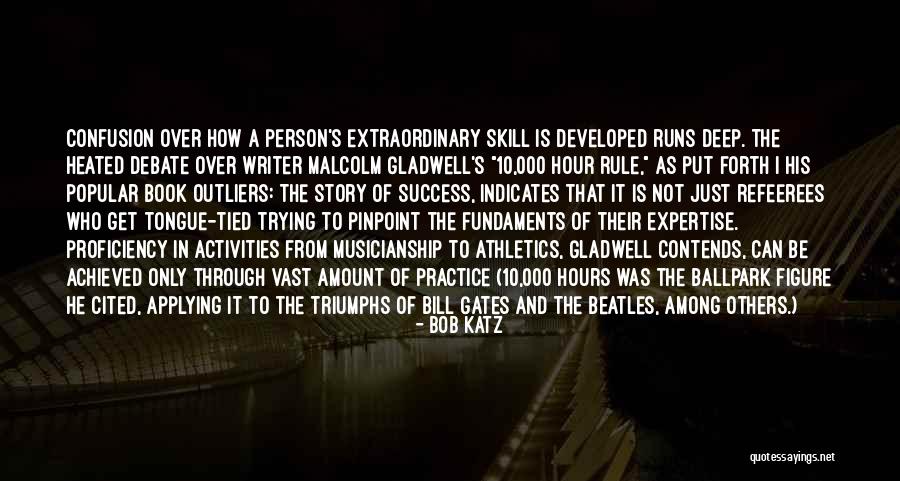
Confusion over how a person's extraordinary skill is developed runs deep. The heated debate over writer Malcolm Gladwell's "10,000 hour rule," as put forth i his popular book Outliers: The Story of Success, indicates that it is not just refeerees who get tongue-tied trying to pinpoint the fundaments of their expertise. Proficiency in activities from musicianship to athletics, Gladwell contends, can be achieved only through vast amount of practice (10,000 hours was the ballpark figure he cited, applying it to the triumphs of Bill Gates and the Beatles, among others.) — Bob Katz
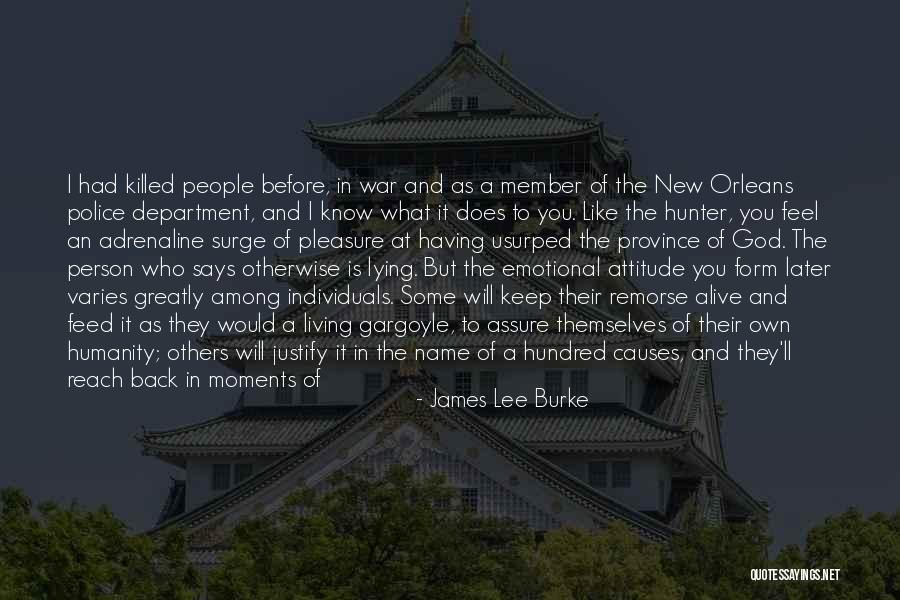
I had killed people before, in war and as a member of the New Orleans police department, and I know what it does to you. Like the hunter, you feel an adrenaline surge of pleasure at having usurped the province of God. The person who says otherwise is lying. But the emotional attitude you form later varies greatly among individuals. Some will keep their remorse alive and feed it as they would a living gargoyle, to assure themselves of their own humanity; others will justify it in the name of a hundred causes, and they'll reach back in moments of their own inadequacy and failure and touch again those flaming shapes that somehow made their impoverished lives historically significant. — James Lee Burke

It is quite a common and vulgar thing among humans to understand, foresee, know and predict the troubles of others. But oh what a rare thing it is to predict, know, foresee and understand one's own troubles. — Francois Rabelais
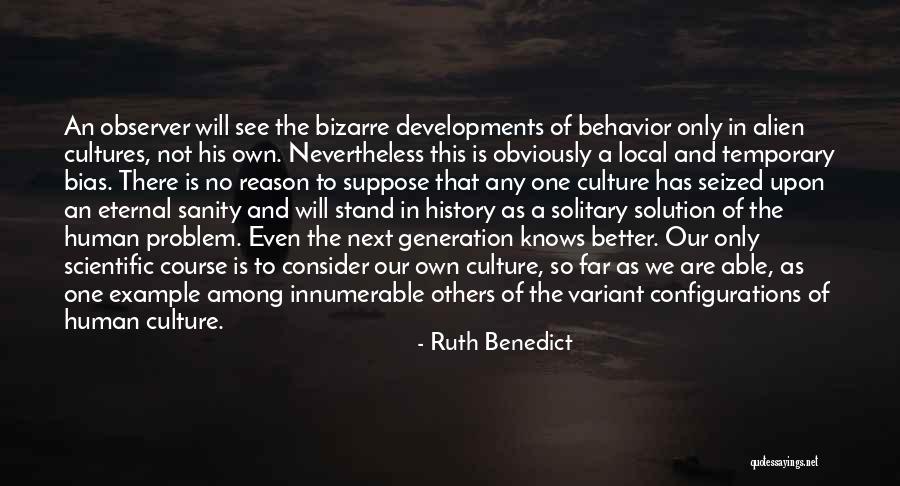
An observer will see the bizarre developments of behavior only in alien cultures, not his own. Nevertheless this is obviously a local and temporary bias. There is no reason to suppose that any one culture has seized upon an eternal sanity and will stand in history as a solitary solution of the human problem. Even the next generation knows better. Our only scientific course is to consider our own culture, so far as we are able, as one example among innumerable others of the variant configurations of human culture. — Ruth Benedict
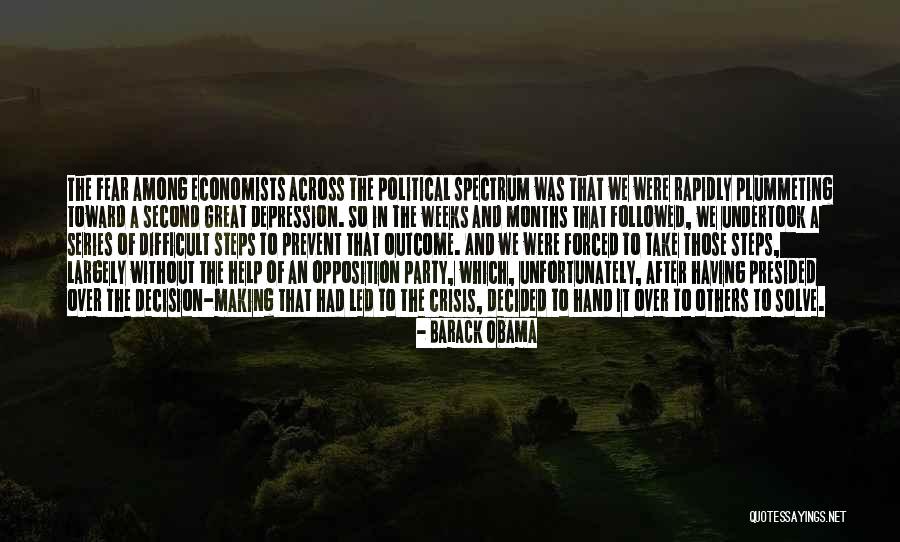
The fear among economists across the political spectrum was that we were rapidly plummeting toward a second Great Depression. So in the weeks and months that followed, we undertook a series of difficult steps to prevent that outcome. And we were forced to take those steps, largely without the help of an opposition party, which, unfortunately, after having presided over the decision-making that had led to the crisis, decided to hand it over to others to solve. — Barack Obama
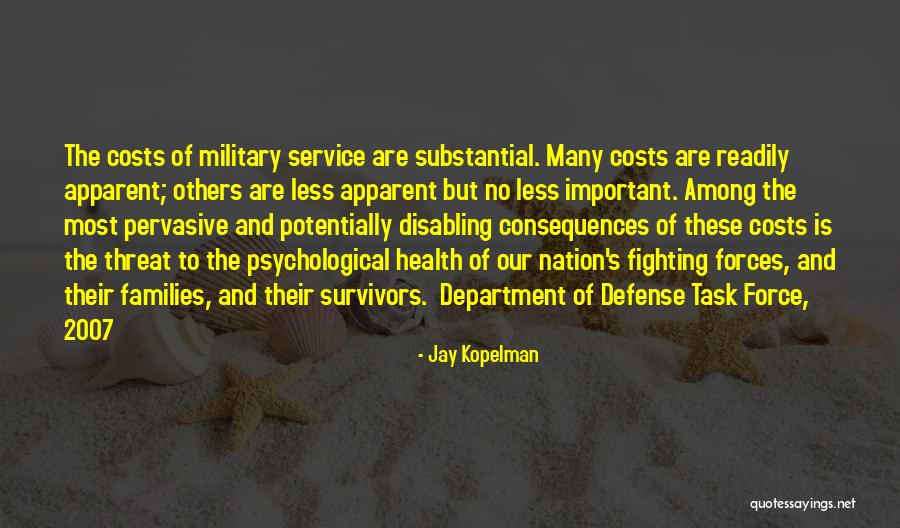
The costs of military service are substantial. Many costs are readily apparent; others are less apparent but no less important. Among the most pervasive and potentially disabling consequences of these costs is the threat to the psychological health of our nation's fighting forces, and their families, and their survivors.
Department of Defense Task Force, 2007 — Jay Kopelman
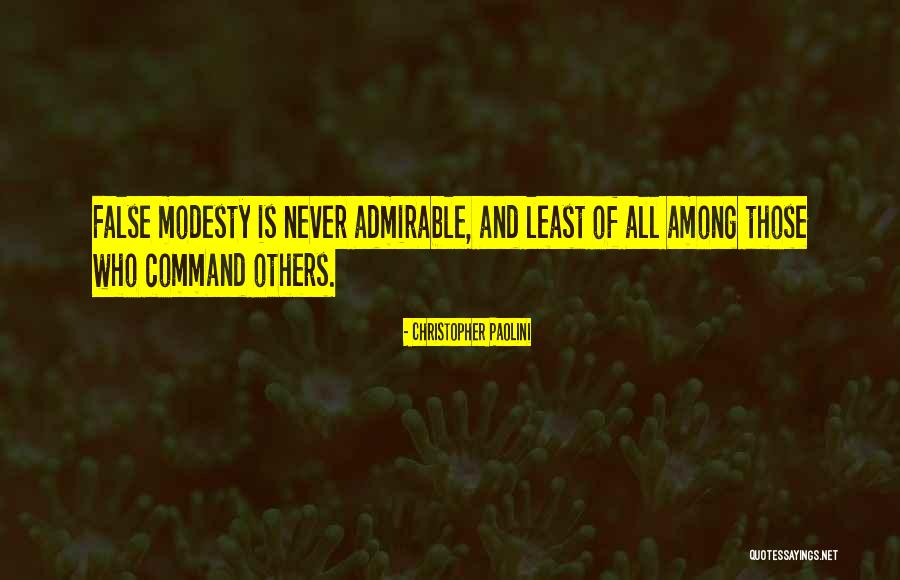
False modesty is never admirable, and least of all among those who command others. — Christopher Paolini
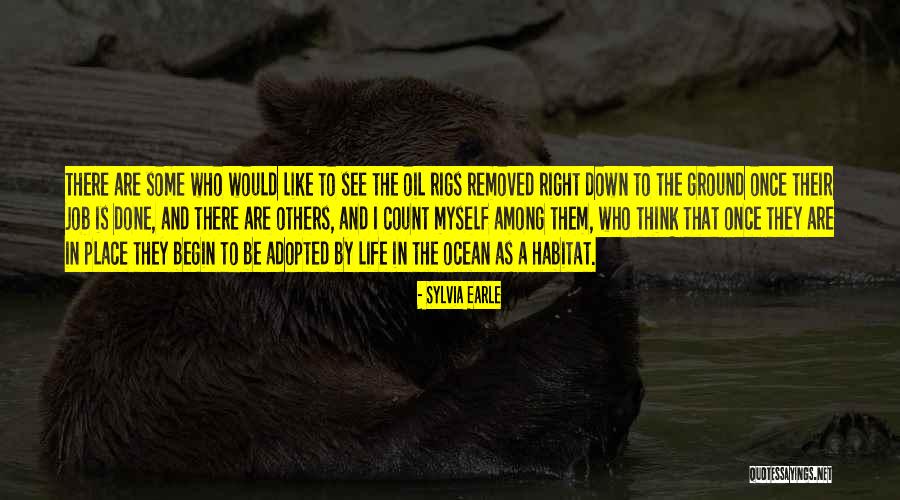
There are some who would like to see the oil rigs removed right down to the ground once their job is done, and there are others, and I count myself among them, who think that once they are in place they begin to be adopted by life in the ocean as a habitat. — Sylvia Earle
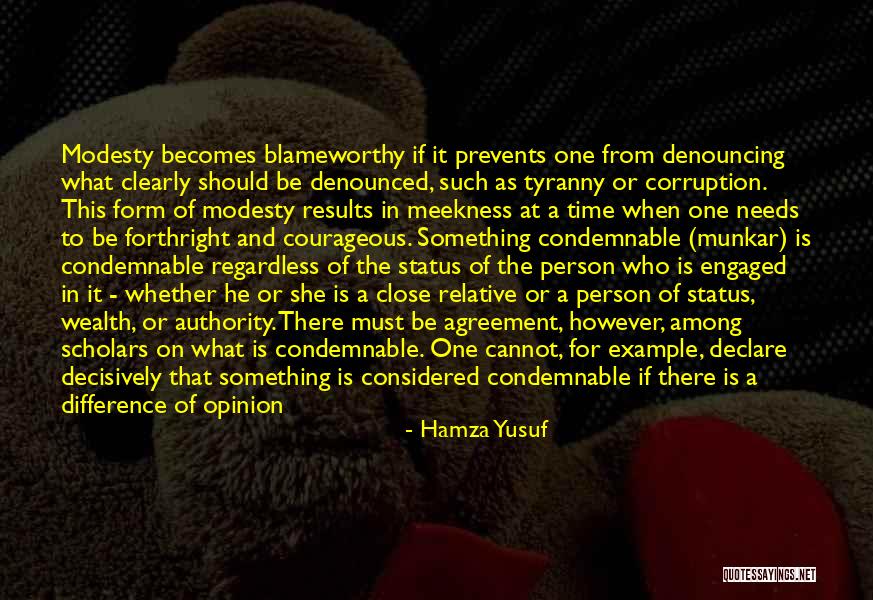
Modesty becomes blameworthy if it prevents one from denouncing what clearly should be denounced, such as tyranny or corruption. This form of modesty results in meekness at a time when one needs to be forthright and courageous. Something condemnable (munkar) is condemnable regardless of the status of the person who is engaged in it - whether he or she is a close relative or a person of status, wealth, or authority. There must be agreement, however, among scholars on what is condemnable. One cannot, for example, declare decisively that something is considered condemnable if there is a difference of opinion on it among the scholars. Scholars knowledgeable of the plentitude of juristic differences rarely condemn others. They refrain from such condemnation not because of modesty but because of their extensive knowledge and scholarly insight. Unfortunately, many people today are swift to condemn, which creates another disease: self-righteousness. — Hamza Yusuf
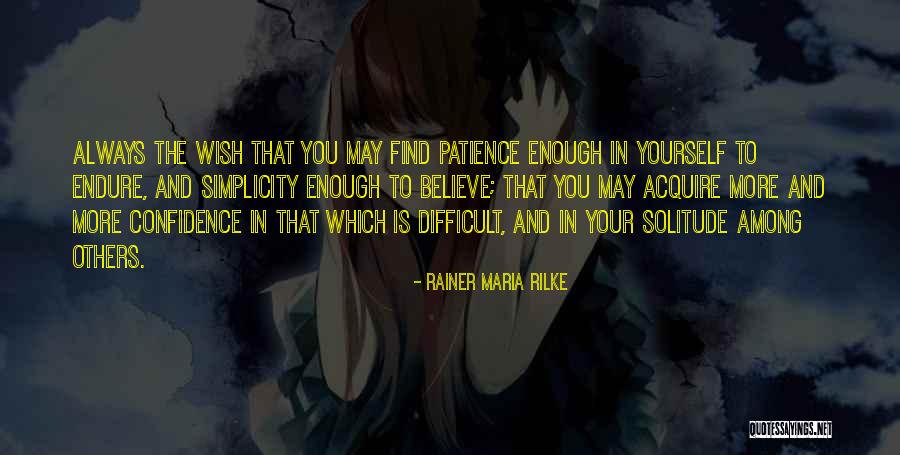
Always the wish that you may find patience enough in yourself to endure, and simplicity enough to believe; that you may acquire more and more confidence in that which is difficult, and in your solitude among others. — Rainer Maria Rilke
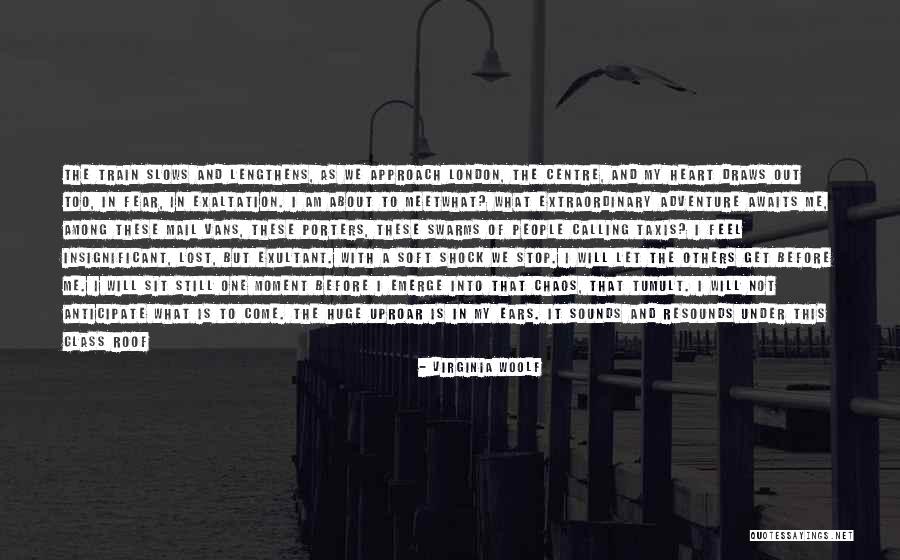
The train slows and lengthens, as we approach London, the centre, and my heart draws out too, in fear, in exaltation. I am about to meet
what? What extraordinary adventure awaits me, among these mail vans, these porters, these swarms of people calling taxis? I feel insignificant, lost, but exultant. With a soft shock we stop. I will let the others get before me. I will sit still one moment before I emerge into that chaos, that tumult. I will not anticipate what is to come. The huge uproar is in my ears. It sounds and resounds under this glass roof like the surge of a sea. We are cast down on the platform with our handbags. We are whirled asunder. My sense of self almost perishes; my contempt. I become drawn in, tossed down, thrown sky-high. I step on to the platform, grasping tightly all that I possess
one bag. — Virginia Woolf
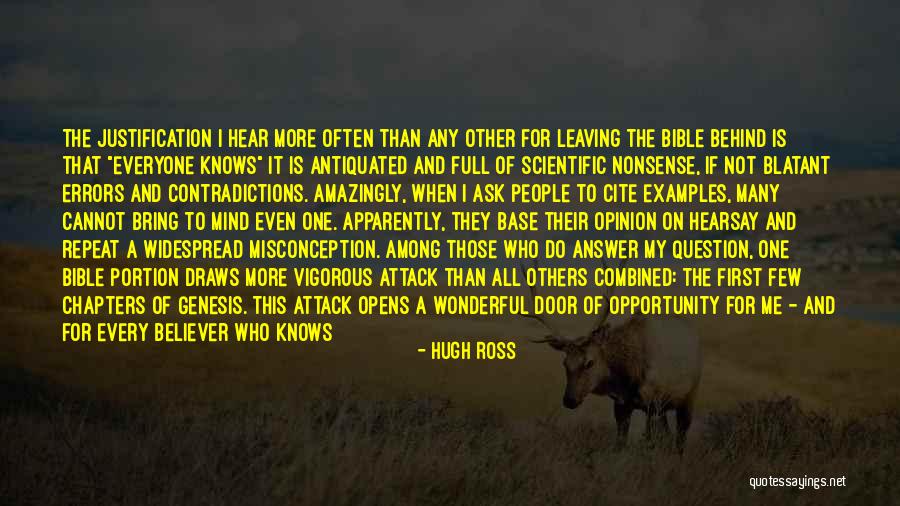
The justification I hear more often than any other for leaving the Bible behind is that "everyone knows" it is antiquated and full of scientific nonsense, if not blatant errors and contradictions. Amazingly, when I ask people to cite examples, many cannot bring to mind even one. Apparently, they base their opinion on hearsay and repeat a widespread misconception. Among those who do answer my question, one Bible portion draws more vigorous attack than all others combined: the first few chapters of Genesis. This attack opens a wonderful door of opportunity for me - and for every believer who knows something about the scientific discoveries of the past few decades. Instead of offering an excuse for disbelief and rejection, these chapters present some of the most persuasive evidences ever assembled for the supernatural authorship, accuracy, and authority of the Bible. — Hugh Ross
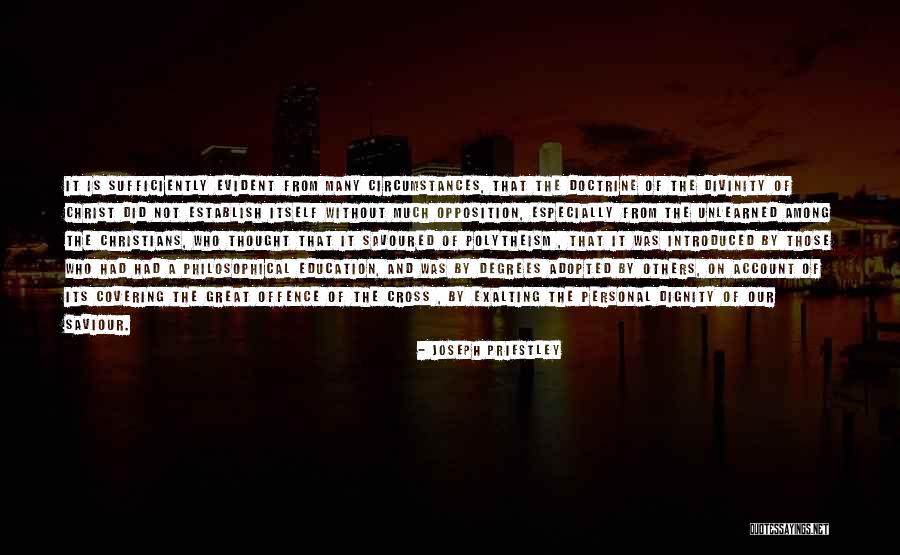
It is sufficiently evident from many circumstances, that the doctrine of the divinity of Christ did not establish itself without much opposition, especially from the unlearned among the Christians, who thought that it savoured of Polytheism , that it was introduced by those who had had a philosophical education, and was by degrees adopted by others, on account of its covering the great offence of the cross , by exalting the personal dignity of our Saviour. — Joseph Priestley

...Alas, Babylon was to be among the first to give a public voice to the fears and anxieties associated with a nuclear attack and with threats of atomic radiation. And unlike others in the genre, he offered unmitigated hope. Randy Bragg and company not only survive the devastation that leaves vast Contaminated Zones throughout the United States, but they also apply the best in themselves to begin the re-establishment of life within a civil society. All of the atomic fears of the 1950s (and later) are there, but Frank's 'message' seems to be that we can survive even the worst catastrophe with everyday, secularized applications of faith, hope, and charity. — Hal Hager
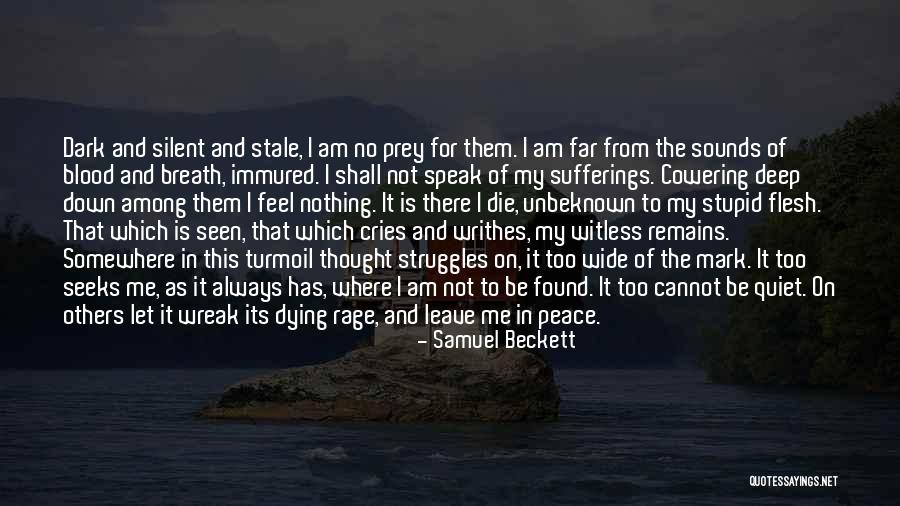
Dark and silent and stale, I am no prey for them. I am far from the sounds of blood and breath, immured. I shall not speak of my sufferings. Cowering deep down among them I feel nothing. It is there I die, unbeknown to my stupid flesh. That which is seen, that which cries and writhes, my witless remains. Somewhere in this turmoil thought struggles on, it too wide of the mark. It too seeks me, as it always has, where I am not to be found. It too cannot be quiet. On others let it wreak its dying rage, and leave me in peace. — Samuel Beckett
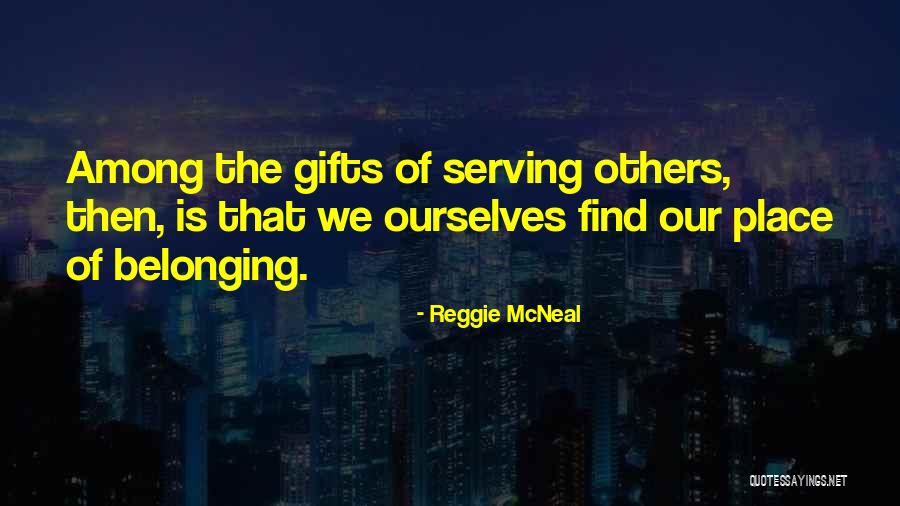
Among the gifts of serving others, then, is that we ourselves find our place of belonging. — Reggie McNeal
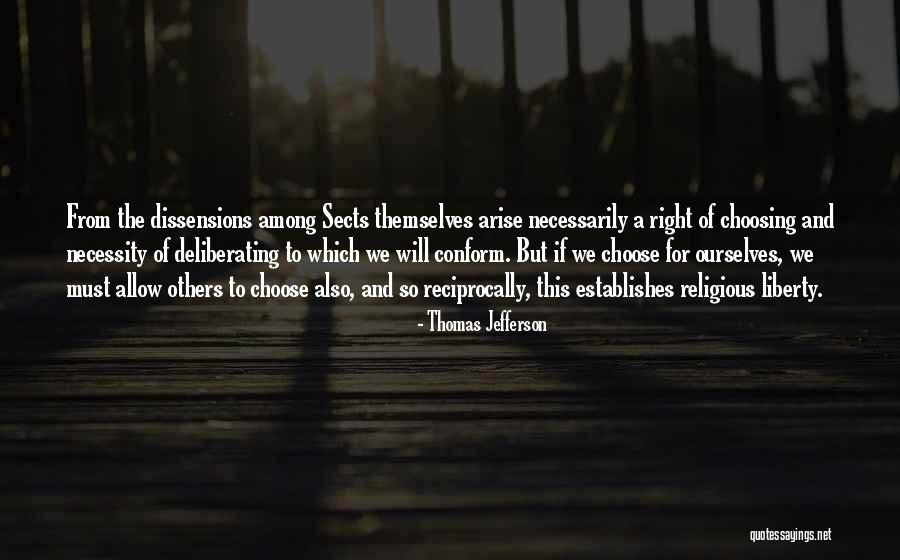
From the dissensions among Sects themselves arise necessarily a right of choosing and necessity of deliberating to which we will conform. But if we choose for ourselves, we must allow others to choose also, and so reciprocally, this establishes religious liberty. — Thomas Jefferson
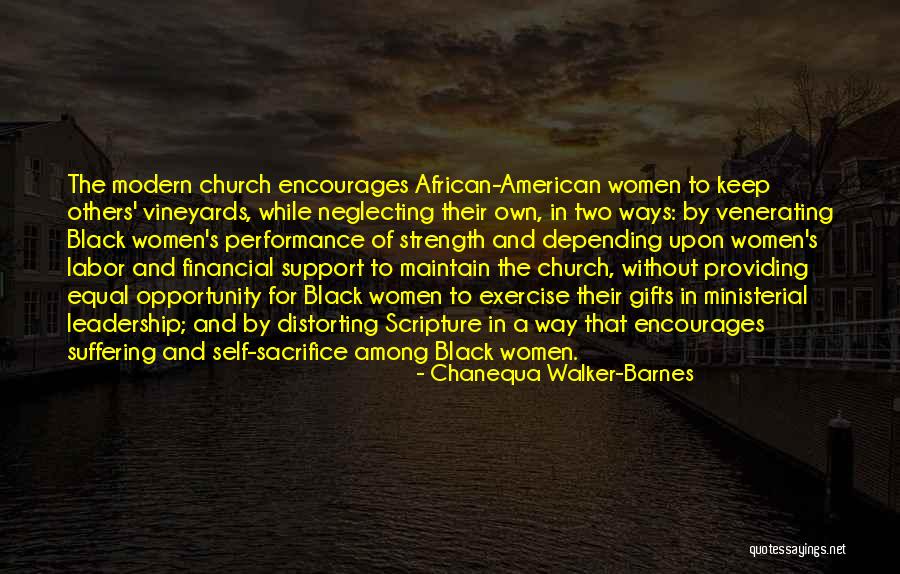
The modern church encourages African-American women to keep others' vineyards, while neglecting their own, in two ways: by venerating Black women's performance of strength and depending upon women's labor and financial support to maintain the church, without providing equal opportunity for Black women to exercise their gifts in ministerial leadership; and by distorting Scripture in a way that encourages suffering and self-sacrifice among Black women. — Chanequa Walker-Barnes
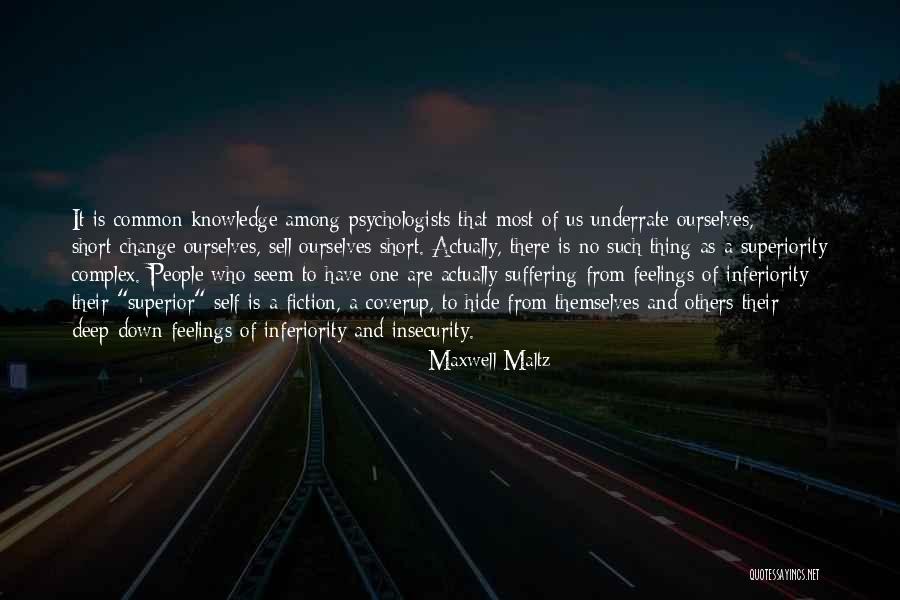
It is common knowledge among psychologists that most of us underrate ourselves, short-change ourselves, sell ourselves short. Actually, there is no such thing as a superiority complex. People who seem to have one are actually suffering from feelings of inferiority; their "superior" self is a fiction, a coverup, to hide from themselves and others their deep-down feelings of inferiority and insecurity. — Maxwell Maltz
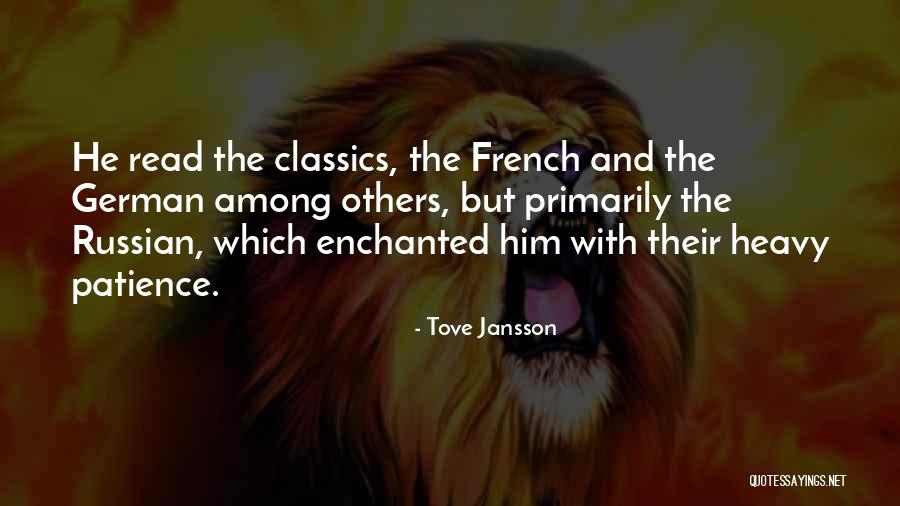
He read the classics, the French and the German among others, but primarily the Russian, which enchanted him with their heavy patience. — Tove Jansson

Luke 8 Women Who Followed Jesus Soon afterward Jesus began a tour of the nearby towns and villages, preaching and announcing the Good News about the Kingdom of God. He took his twelve disciples with him, 2 along with some women who had been cured of evil spirits and diseases. Among them were Mary Magdalene, from whom he had cast out seven demons; 3 Joanna, the wife of Chuza, Herod's business manager; Susanna; and many others who were contributing from their own resources to support Jesus and his disciples. — Anonymous






